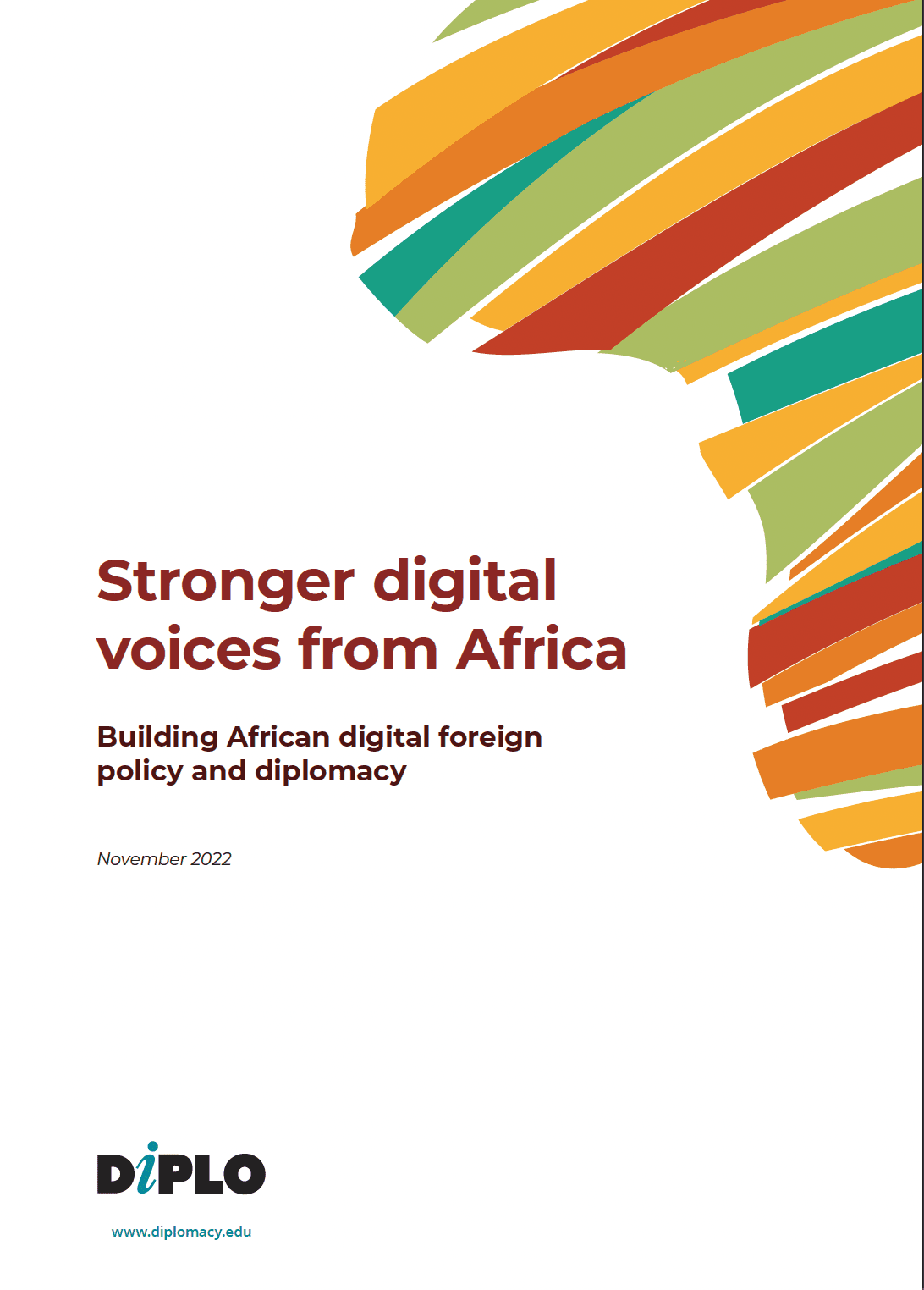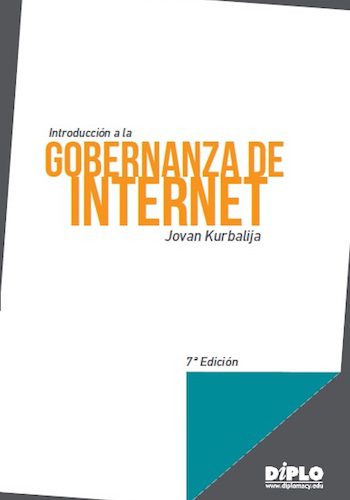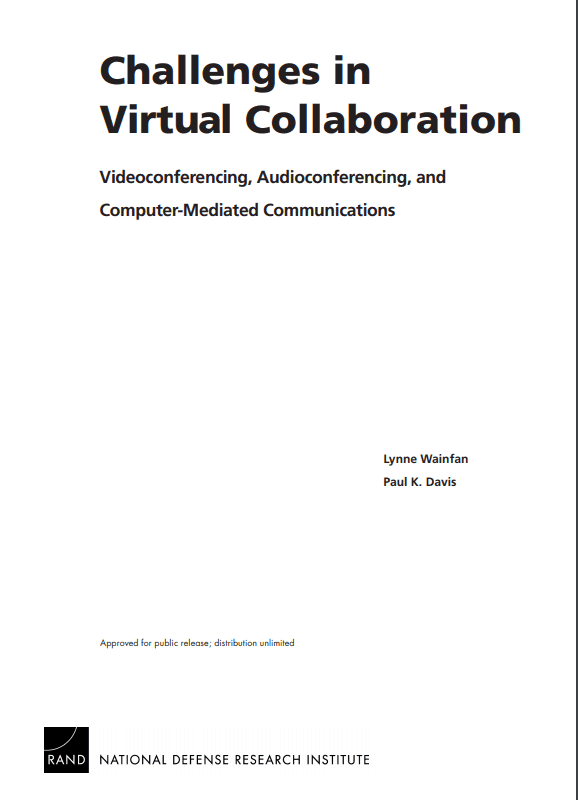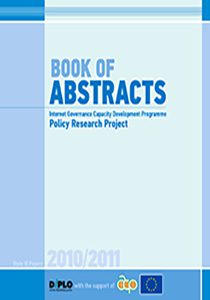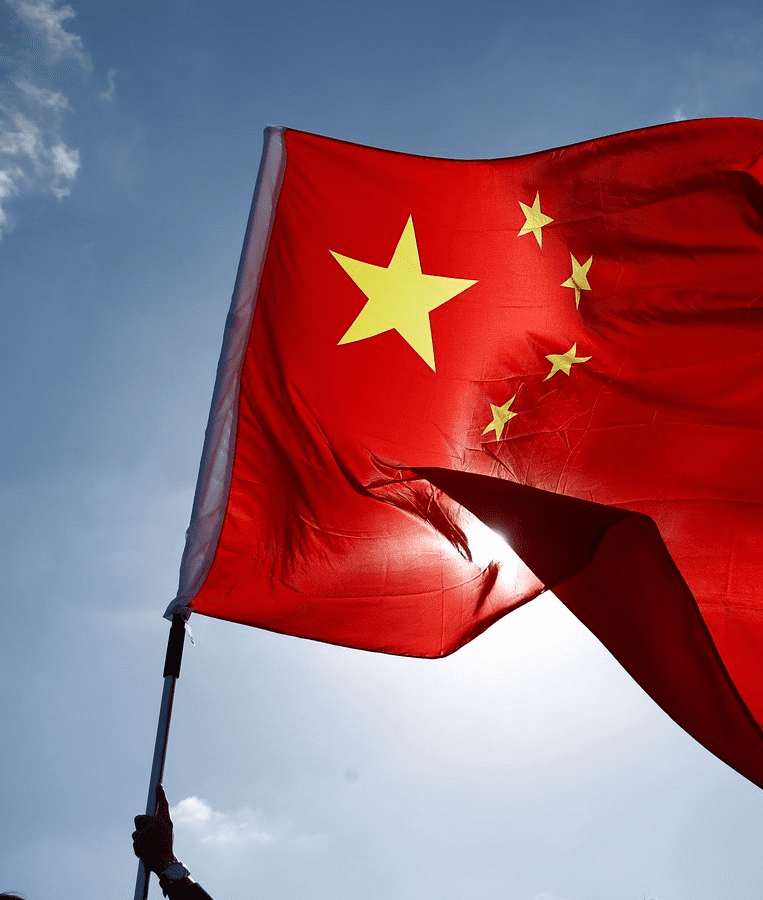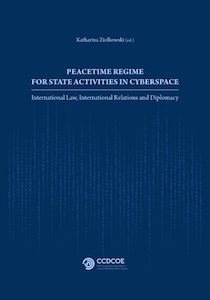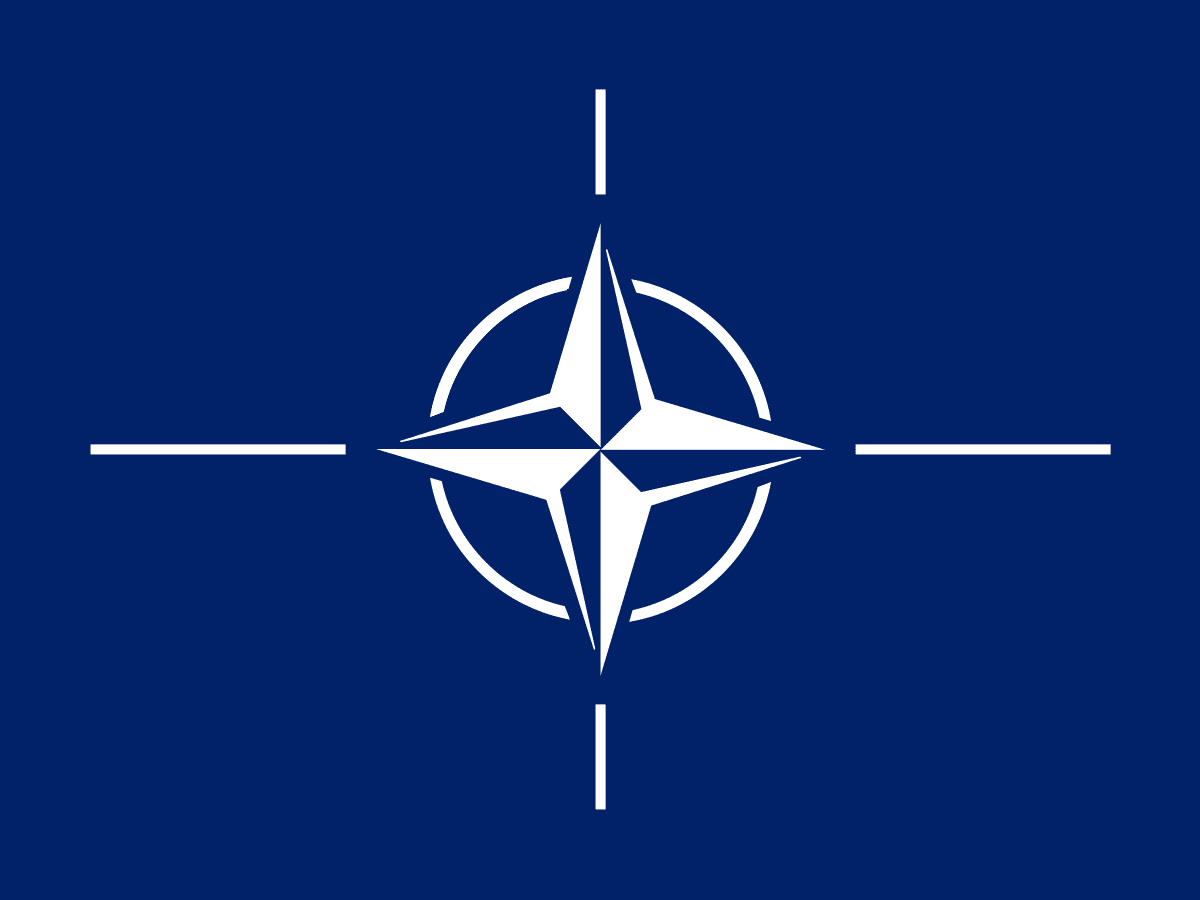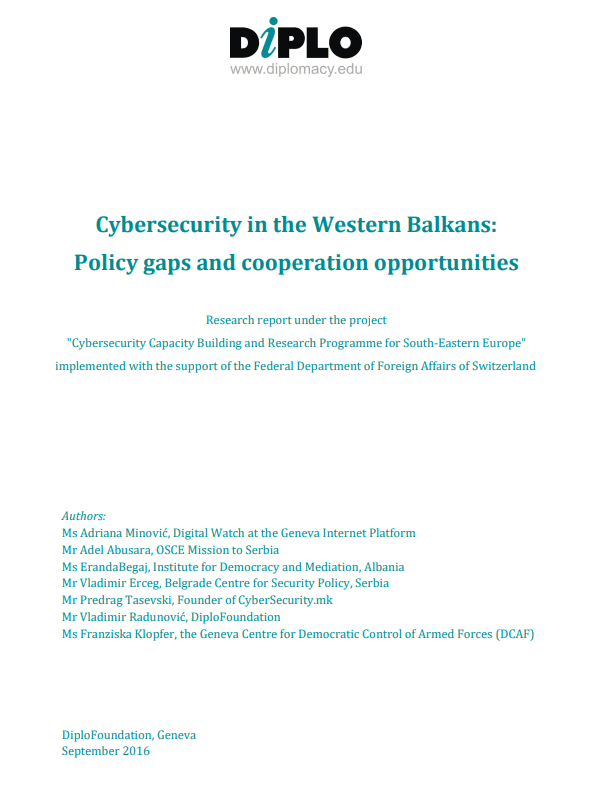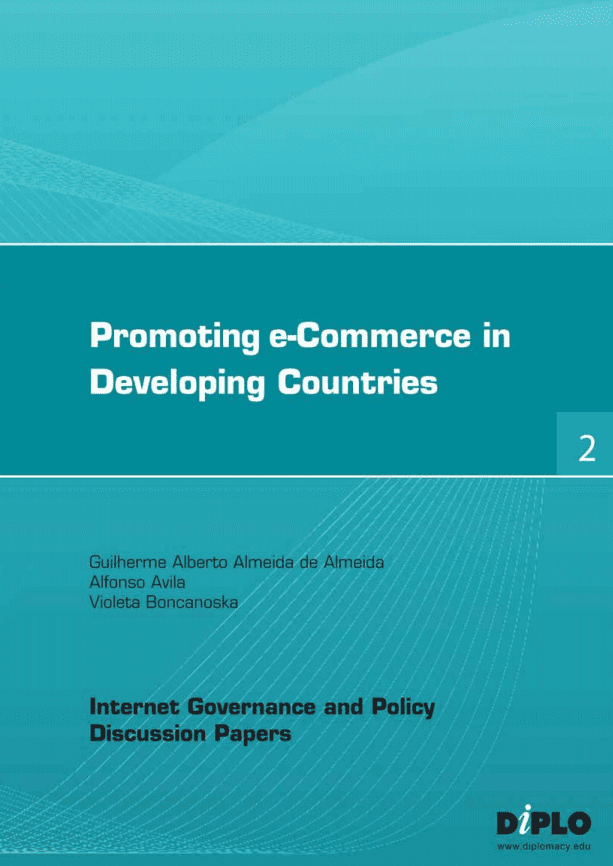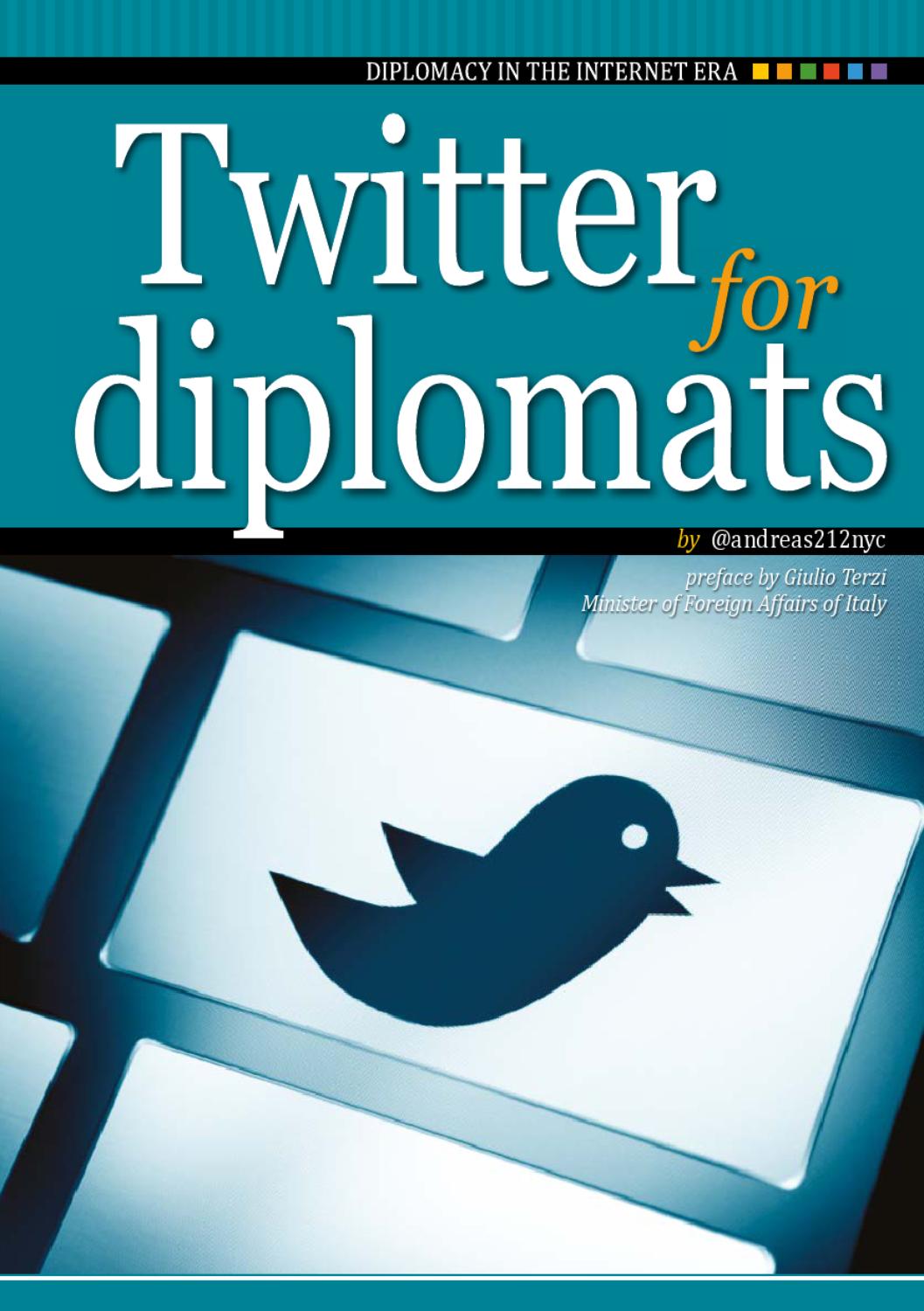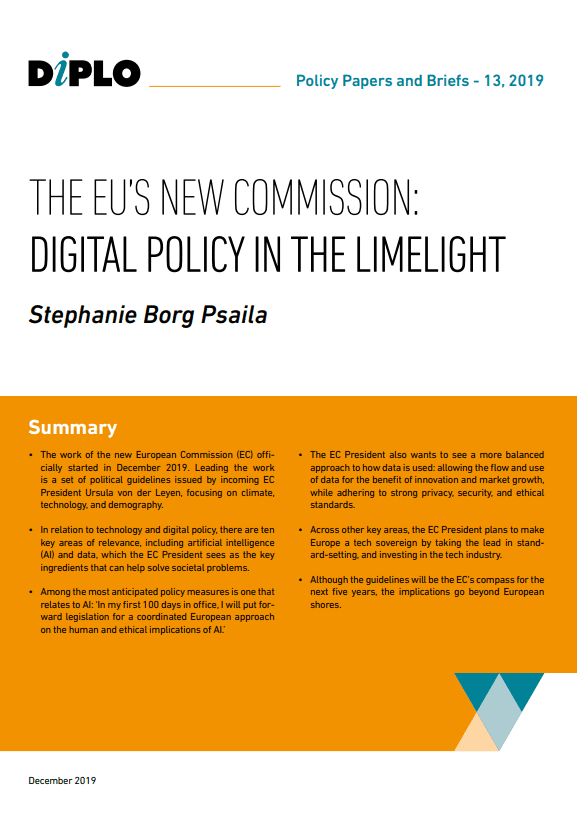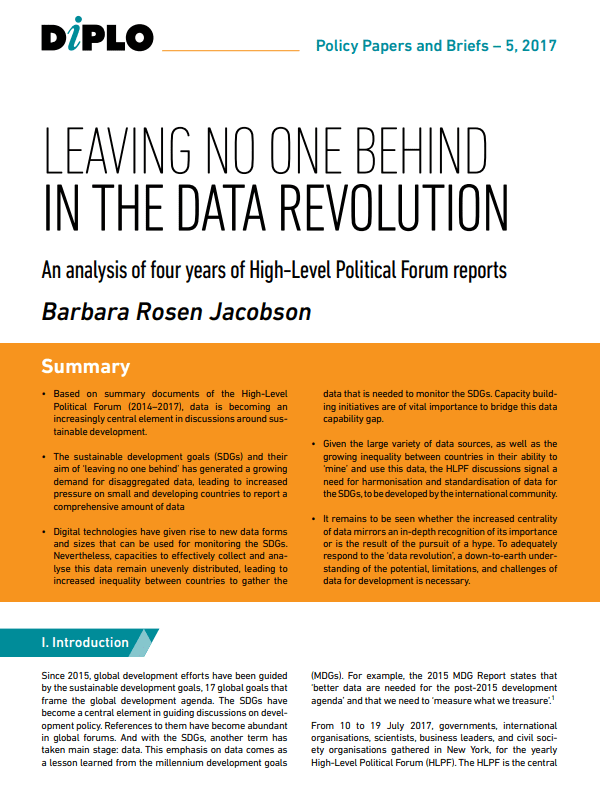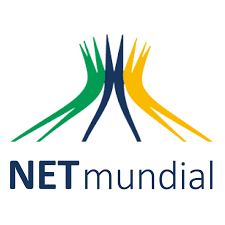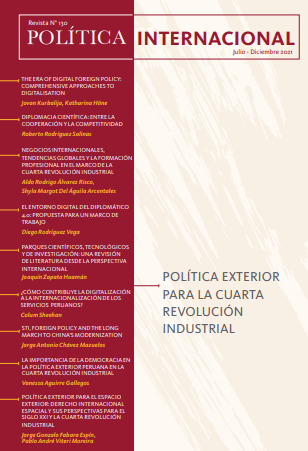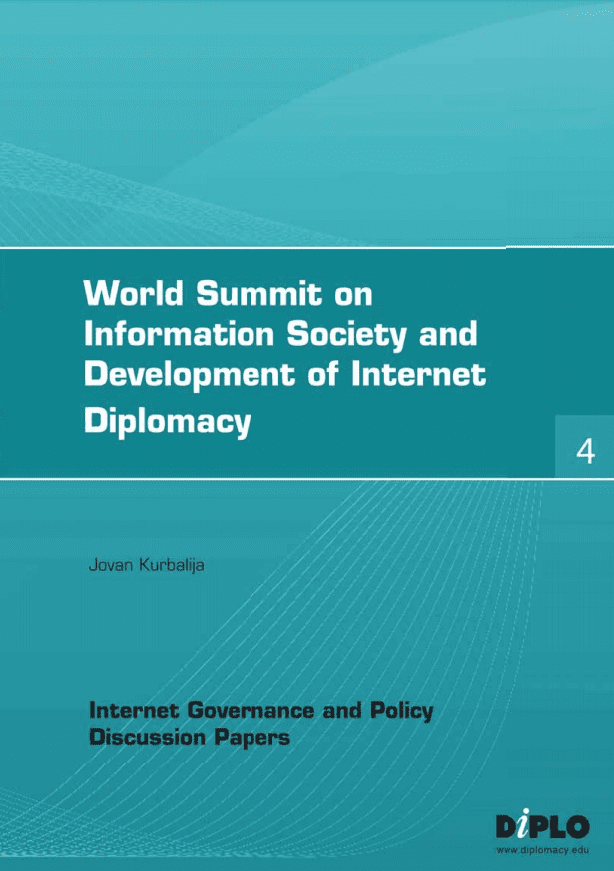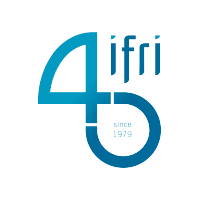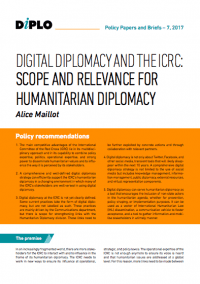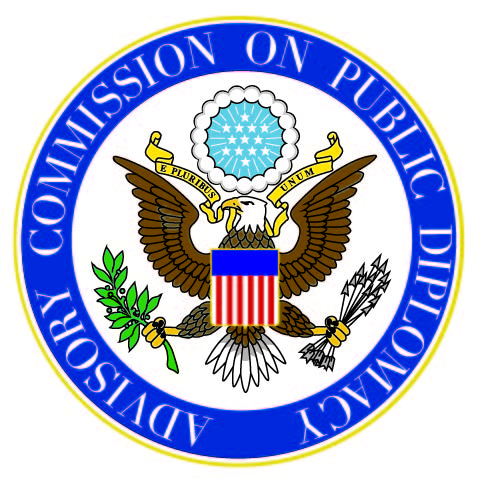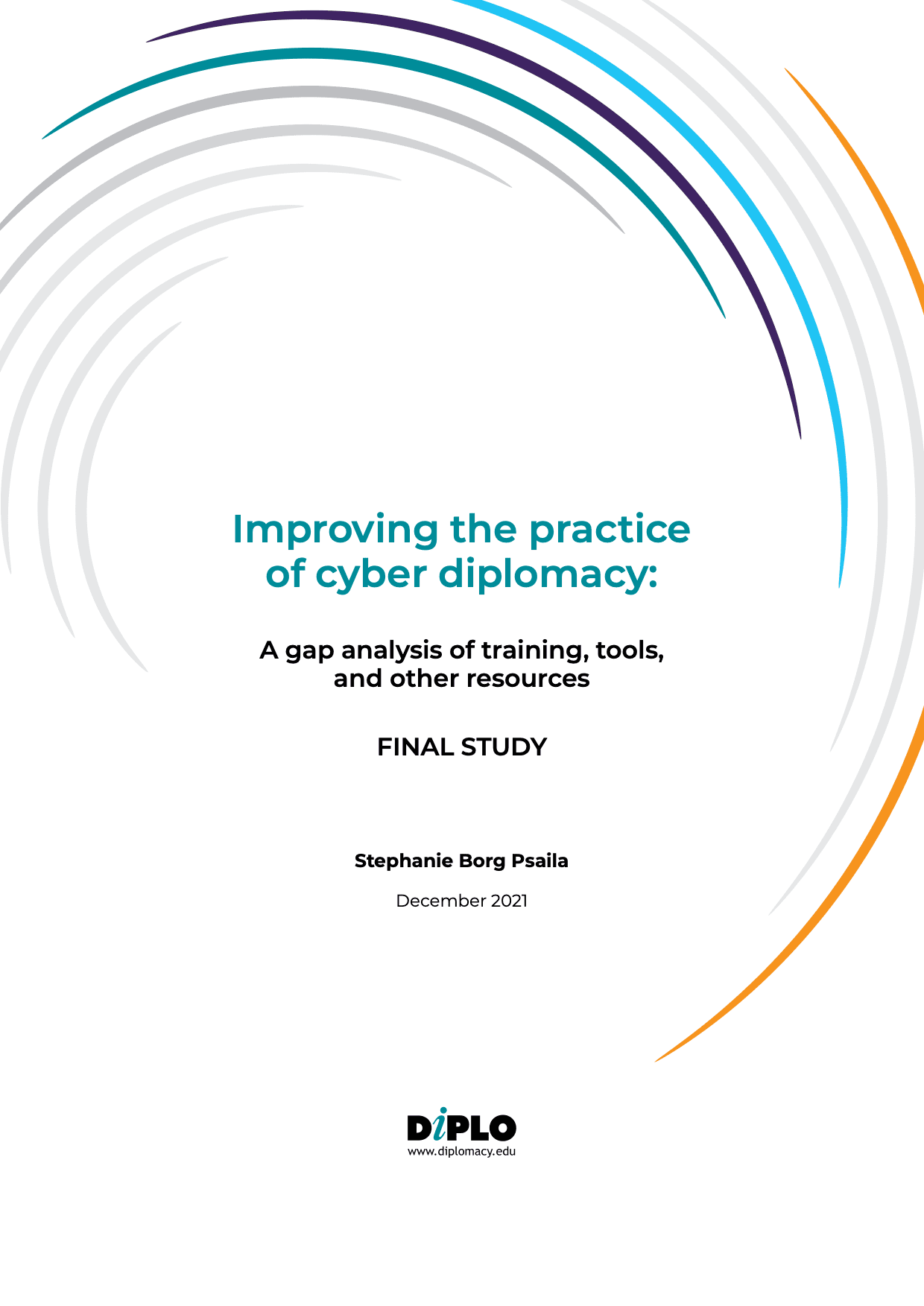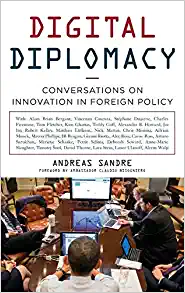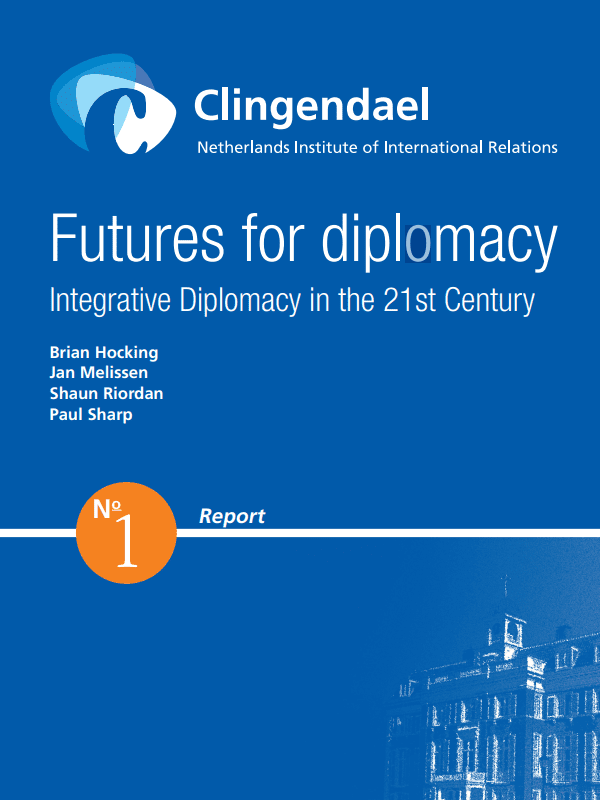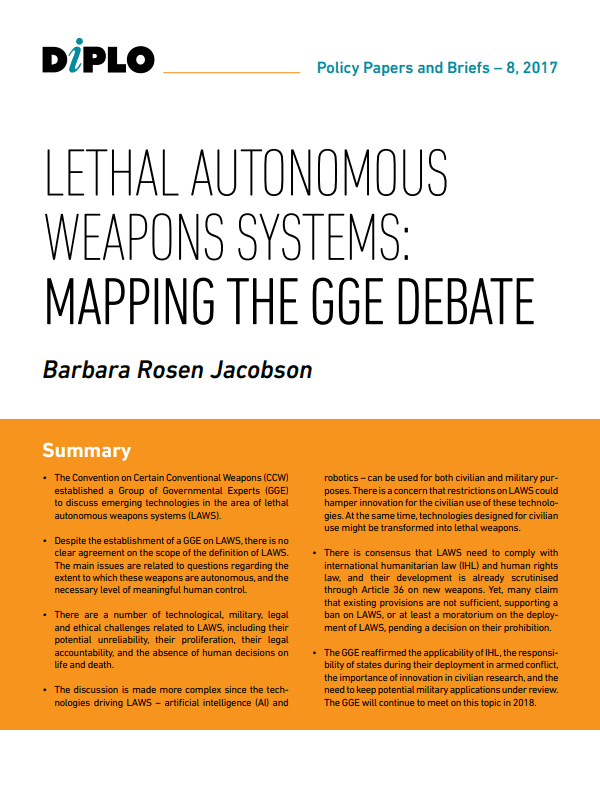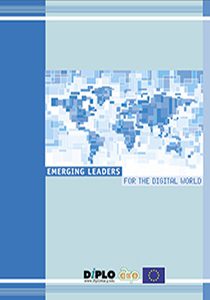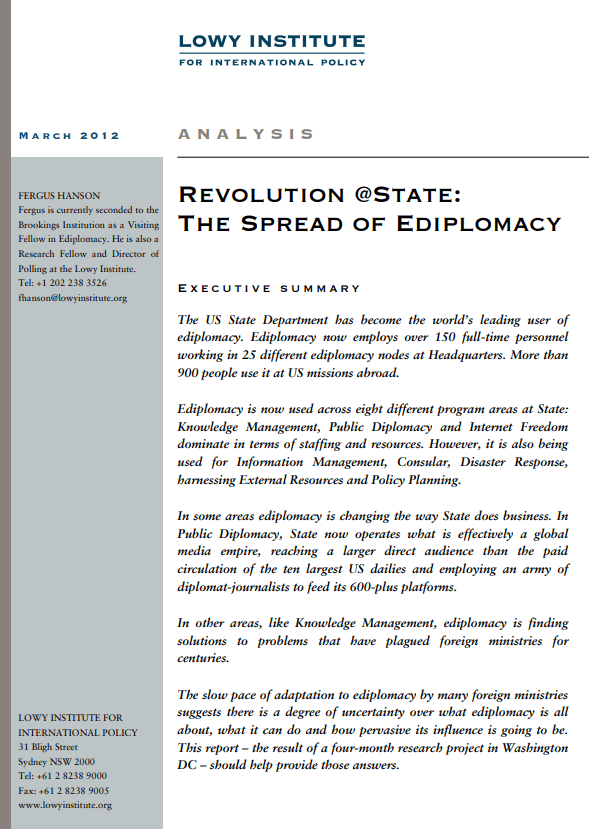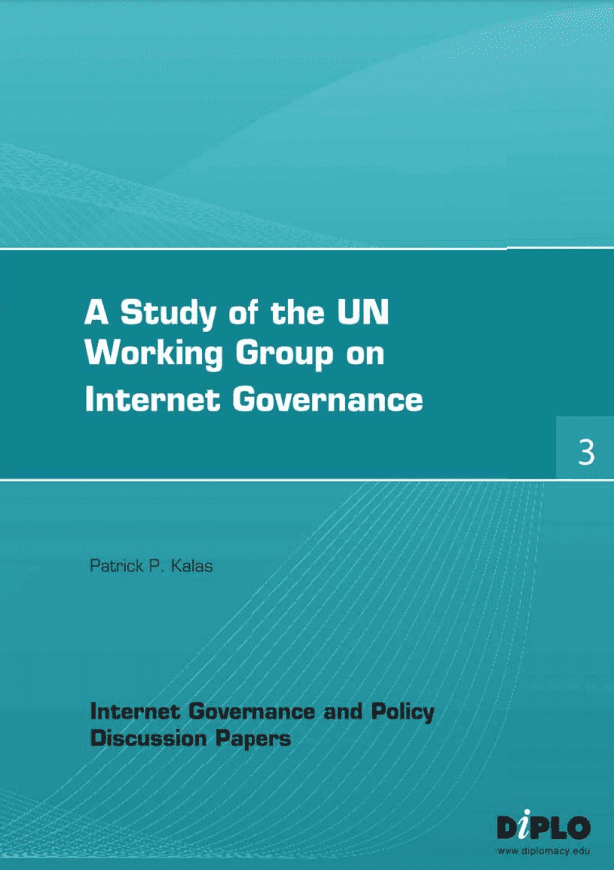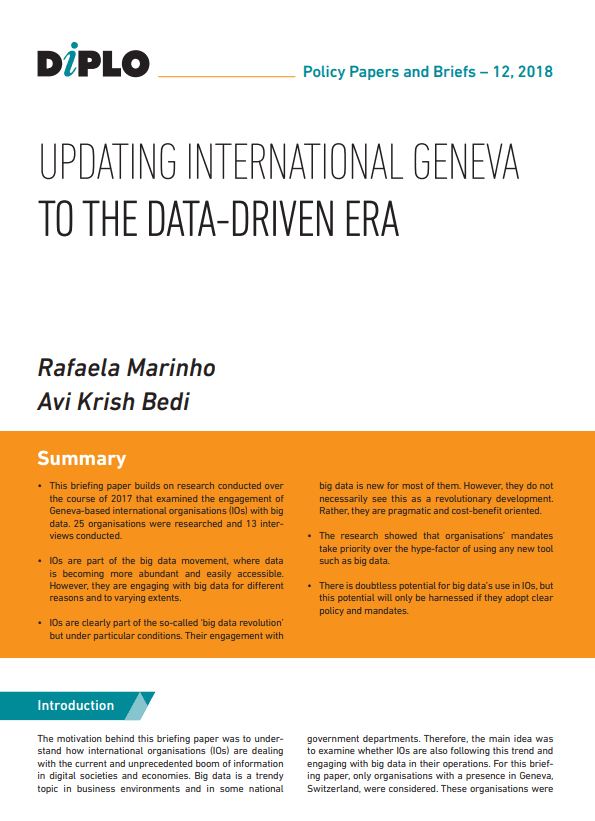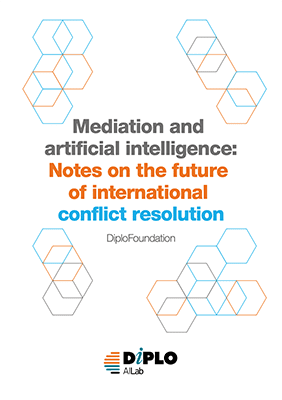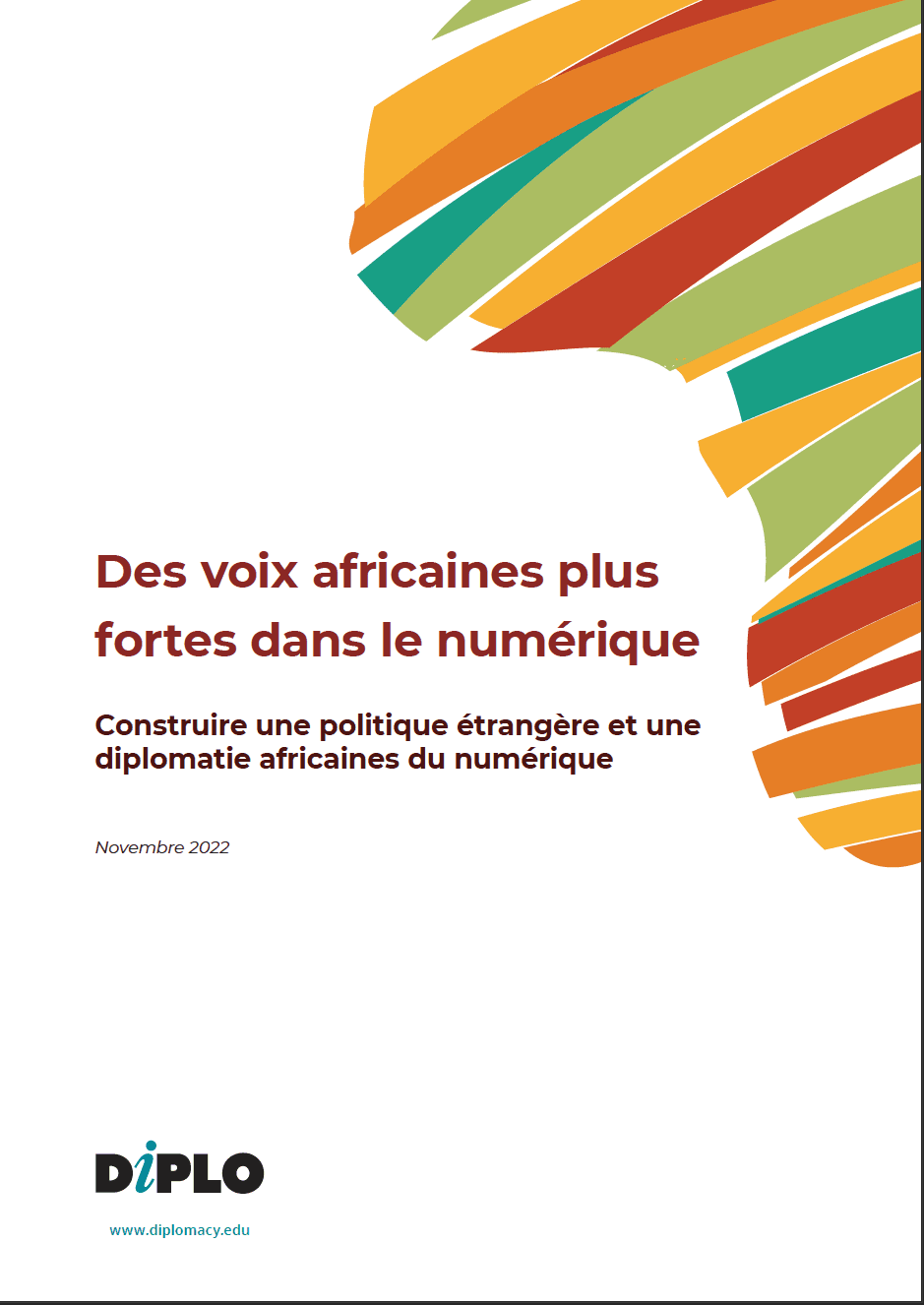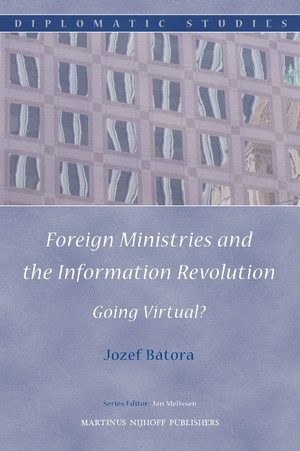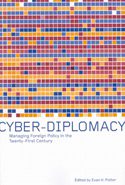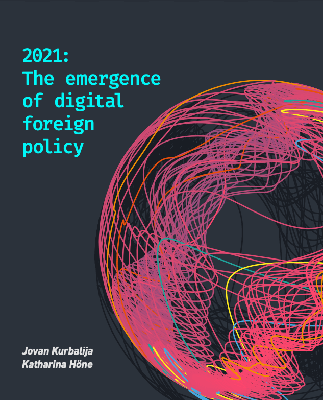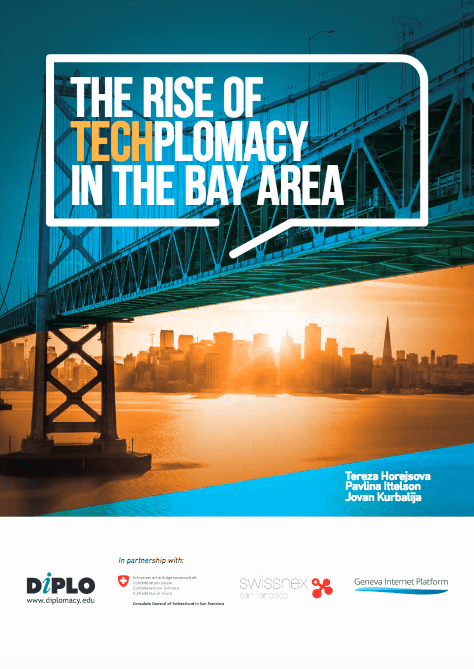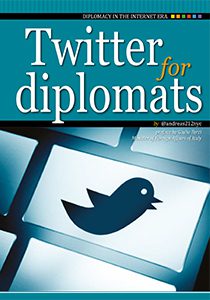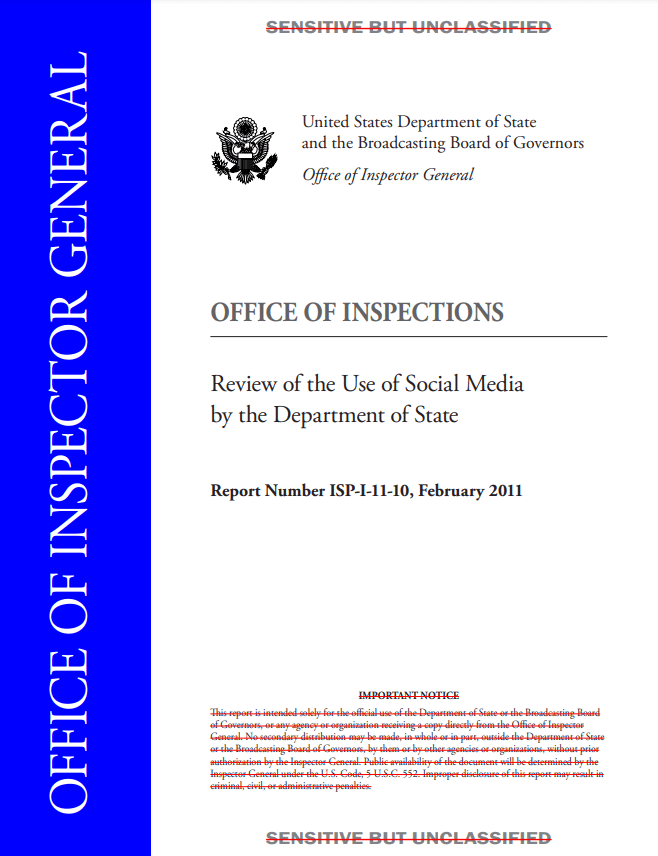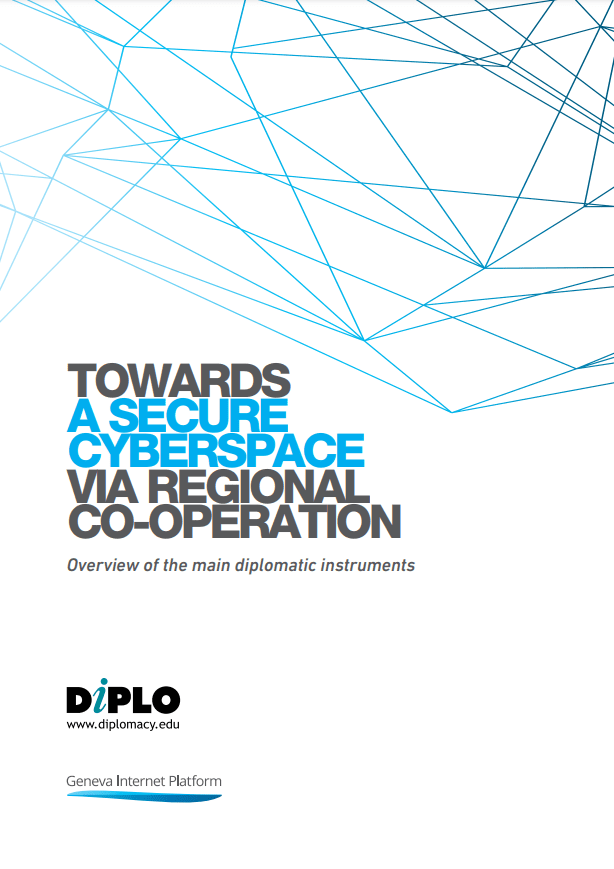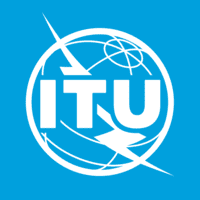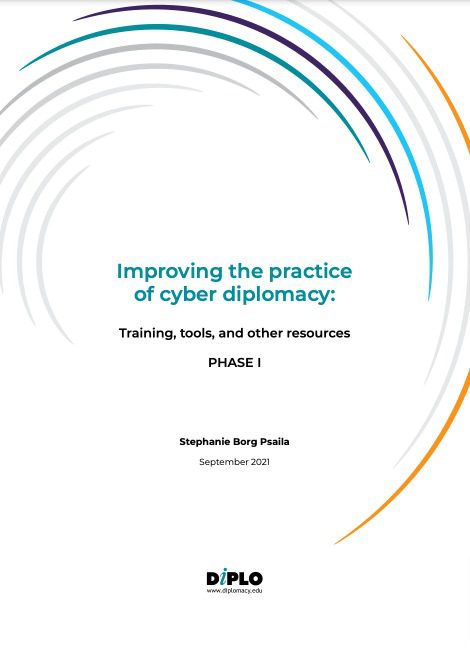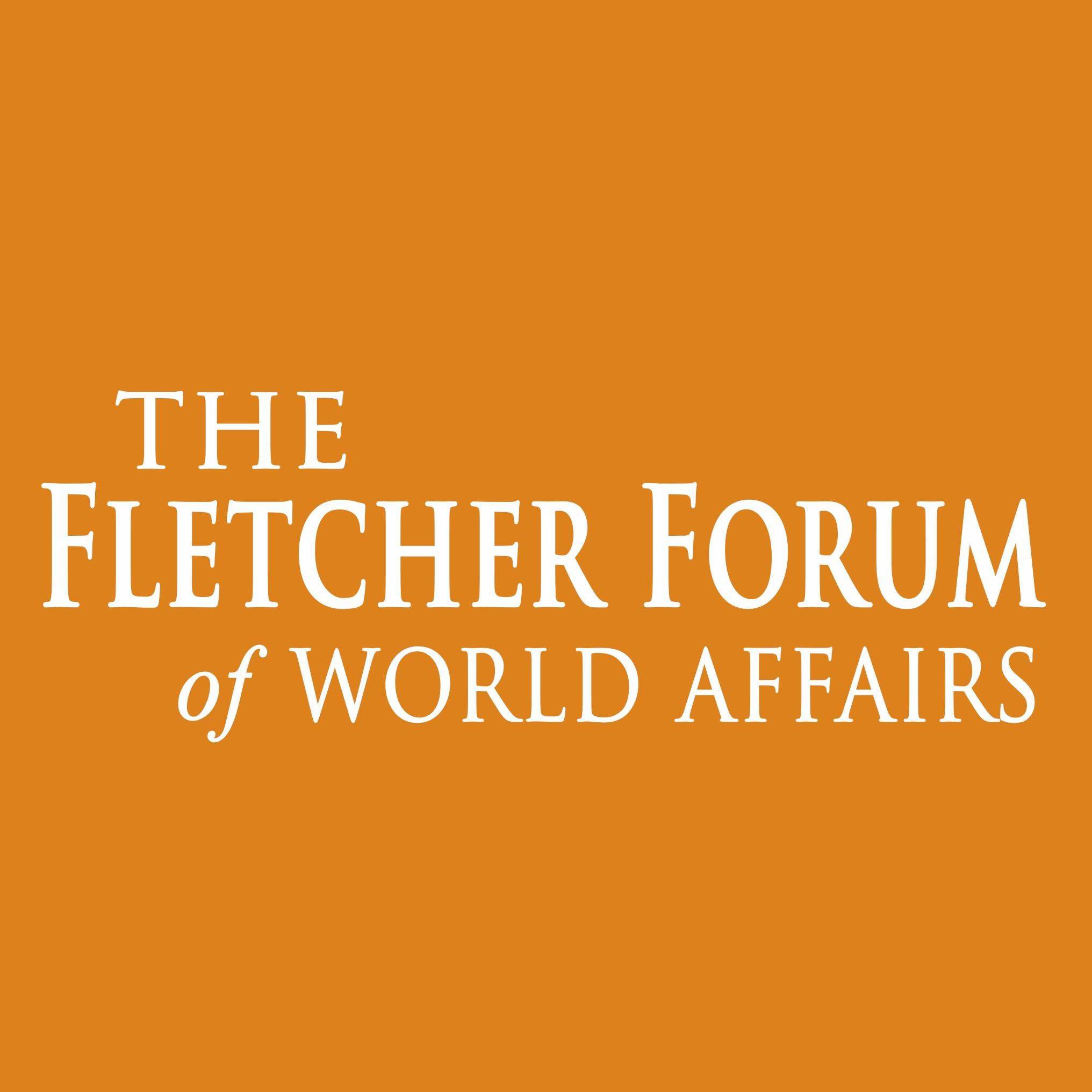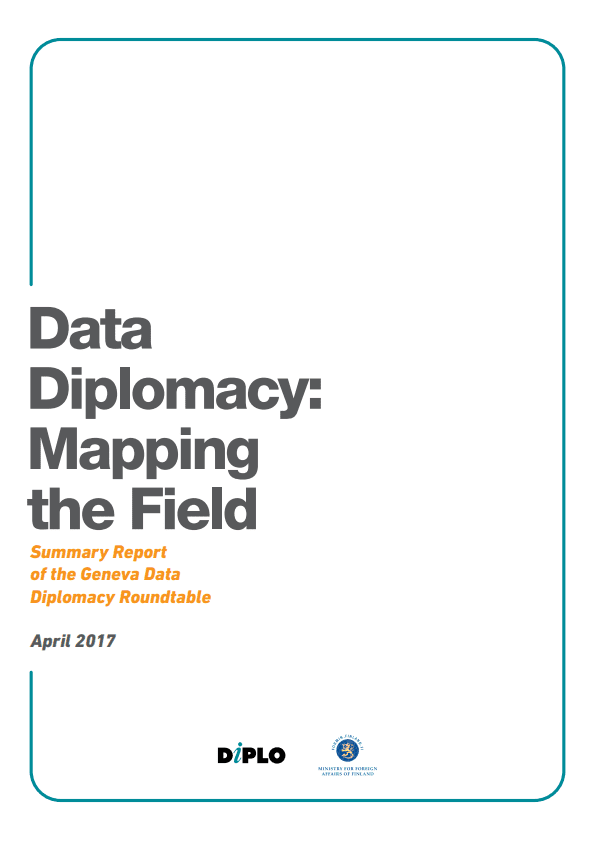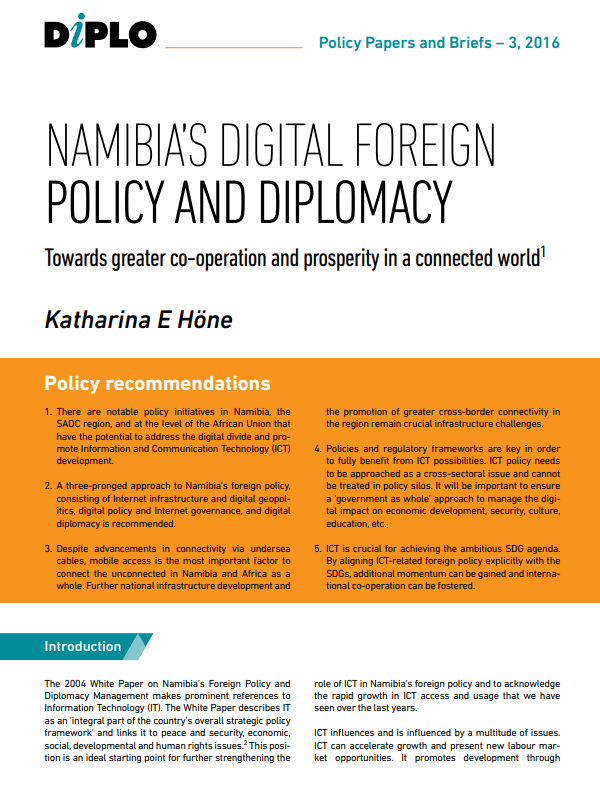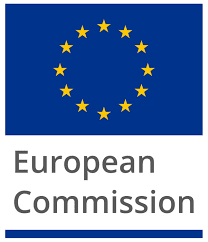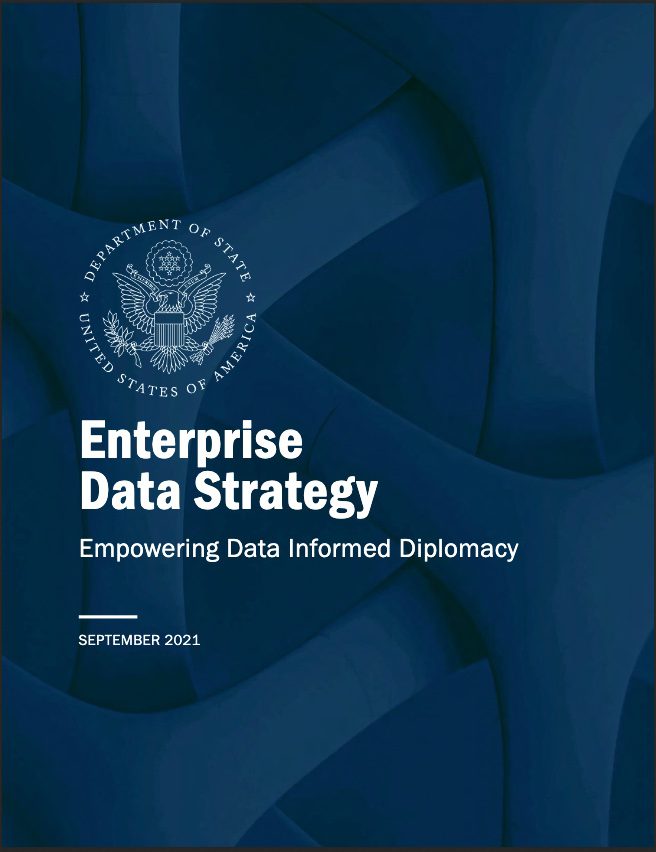Authors: Sorina Teleanu | Jovan Kurbalija
Stronger digital voices from Africa: Building African digital foreign policy and diplomacy
2022
The report is also available in French.
Ask about AI and Digitalisation in Africa
About this study
Africa’s voices are weak in negotiations on digital topics, from cybersecurity to the future of data and e-commerce. The continent’s participation in global policy-making does not reflect its current digital dynamism, with millions becoming connected, e-commerce growing rapidly, and new solutions being created.
As Africa’s digital dynamism grows, its participation in global digital policy must increase. In this transition, African countries have to navigate the geopolitical realities of our times.
This study provides a snapshot of Africa’s digital diplomacy by examining the holistic representations of national and continental interests in the digital realm. In addition to the role of official diplomacy, this study also looks at the roles of tech developers, businesses, local communities, and others with the necessary skills and expertise for participation in international digital policy.
Many African countries must mobilise all human and institutional resources to enable their active engagement in digital foreign policy and diplomacy. While most African countries are in the early phase of their digital diplomacy journey, there are many practices and initiatives that could help a faster take off of digital diplomacy in Africa. These practices and initiatives are identified in this study with many concrete examples, 55 charts and infographics, over 500 references, and case studies of 8 African countries.
Although the study is focused on Africa, it is fundamentally about digitalisation worldwide. The digital realm cannot be developed into an enabling, secure engine for human prosperity without Africa’s active involvement in digital diplomacy.
We invite you to join us on this policy and learning journey towards stronger digital voices from Africa.
Sorina Teleanu and Jovan Kurbalija
Executive summary
As late-comers to digitalisation and digital transformation processes, countries in Africa lag behind in terms of digital development. But while internet penetration rates are still at low levels (although the growth rates are considerable) and digital divides within countries remain high, governments and regional institutions are putting in place policies and strategies to encourage the uptake of digital technologies as drivers of development and to foster inclusive digital economies and societies.
Beyond initiatives focused on advancing digital development at a national, regional, and continental level, Africa also needs stronger voices in global digital governance. And while countries across the continent do not have dedicated digital foreign policy strategies, elements of such policy can be found in various digital strategies and other national documents, as well as identified in contributions of African countries to global digital policy processes. Our study explores such elements and makes the case for a more active engagement of African stakeholders in organisations and processes that tackle key internet and digital policy issues.
There is a strong opinion that Africa could – and should – use digital transformation as an opportunity to take the destiny of countries, citizens, and communities in the continent’s own hands, instead of being on the receiving end of global geopolitical and geoeconomic battles (as has happened many times in the past). A sustained engagement in global digital governance could contribute to this, by ensuring that African interests, priorities, and goals are meaningfully considered.
Global trends in digital foreign policy and diplomacy
Before diving into the African digital (foreign) policy scene, we look at one emerging trend in digital diplomacy: the adoption of digital foreign policy strategies. Countries have begun elaborating such strategies as a way to anchor digital issues more firmly in their foreign policy.
An analysis of the digital foreign policy strategies of Australia, Denmark, France, the Netherlands, and Switzerland reveals several key issues: digital infrastructure, digital as a factor in development, cybersecurity, economic issues (e-commerce and trade in particular), and human rights (e.g. privacy, freedom of expression). In addition to outlining goals and objectives to be achieved in relation to these issues, the strategies also emphasise an integrated dual approach to digital foreign policy: the whole-of-government approach, in which ministries of foreign affairs are joined by other ministries and agencies in conducting foreign policy, and the whole-of-society approach, which recognises that non-state actors – the business sector, the technical community, civil society, and academia – have an important role to play as well.
The adoption of dedicated digital foreign policy strategies, however, is not the only way for countries to integrate digital issues into their foreign policies. This can also be done through embedding digital issues into general foreign policy strategies, or through including elements of foreign policy in digital-related strategies and policies dealing with issues such as cybersecurity, digital economy, and infrastructure.
Elements of digital foreign policy in Africa
Holistic approach
Despite not having elaborated specific digital foreign policy strategies, African countries have embedded elements of foreign policy in various strategies and plans, be they related to the overall digitalisation and digital transformation of the economy and society, or focused on specific issues such as cybersecurity, broadband, or digital economy.
When countries elaborate plans and policies focused on digitalisation and digital transformation in a holistic manner (e.g. Kenya’s National Digital Master Plan or Côte d’Ivoire’s National Digital Development Strategy), they often outline outward-looking goals. Such goals are related to enhancing countries’ competitiveness on international markets; building partnerships with international entities (e.g. donors, development agencies and banks, regional and international intergovernmental organisations, multinational tech companies) to help achieve domestic digital transformation goals; fostering overall international cooperation on digital policy topics; and harmonising ICT/digital-related domestic policies and legal and regulatory frameworks with relevant international frameworks.
Similar goals also appear in continental and regional policies adopted at the level of the African Union (AU) and various regional economic communities (RECs). The AU’s Agenda 2063 and the Digital Transformation Strategy talk, for instance, about strengthening the continent’s presence in the global digital economy (as both a producer and a consumer), fostering cooperation with international entities on issues such as advancing digital skills and supporting digital entrepreneurship, and increasing participation in international internet governance and digital policy processes.
Beyond domestic policies, countries’ priorities and goals are also reflected in their contributions to international processes that address digital policy issues. To illustrate, the number of African countries raising digital topics – digital inclusion, cybersecurity, digital economy, and human rights – in their interventions at the UN General Assembly (the General Debate) increased from 8 in 2017 to 24 in 2022. But this still represents less than half of all countries in the region. At the UN Security Council, Ghana, Kenya, and South Africa – which have held non-permanent member seats recently – have been particularly active in discussions on the interplay between digital technologies and peace and security.
Over the past five to six years, there has been a sustained engagement of African actors – in particular, civil society – in meetings of the Internet Governance Forum (IGF). This engagement has also led to the launch of a growing number of national and regional IGF initiatives across the continent – forums that governments and regional institutions could help strengthen and then leverage as spaces to advance a whole-of-society approach to digital governance and foreign policy.
Digital infrastructure and standards
The adoption and enforcement of international technical standards and strengthened participation in relevant standardisation processes are also envisioned as goals in several domestic policies and strategies (e.g. Ghana, Kenya, Namibia, Nigeria, Senegal, and South Africa).
Actors from all African countries participate at ITU; these include not only specialised ministries or agencies, but also academic institutions, telecom operators, internet service providers (ISPs), and other private entities. Some of these actors – from countries such as Algeria, Côte d’Ivoire, Egypt, Ghana, Morocco, Nigeria, Rwanda, Sudan, and Tunisia – also hold leadership roles across several study groups of ITU Sectors. There is also a relatively strong engagement of African actors – in particular from the technical community and civil society – in the work of the Internet Corporation for Assigned Names and Numbers (ICANN). Compared with the relatively good participation of African actors in ITU standardisation work, there is less involvement in other international standardisation processes such as the International Organization for Standardization (ISO) and the Internet Engineering Task Force (IETF).
Human rights
Privacy and personal data protection in the context of digital services and technologies is a concern that most African countries have tried to address through data protection laws. But differences between such laws and enforcement difficulties create a complex and unharmonised environment, which tends to put Africa at a disadvantage in the global digital economy. The AU Data Policy Framework is expected to contribute to addressing some of these challenges.
Other challenges the continent faces when it comes to human rights in the digital space take the form of internet restrictions (e.g. social media shutdowns, content throttling measures, or complete internet blackouts). In 2019, the African Commission on Human and Peoples’ Rights (ACHPR) called on countries to refrain from measures involving removing, blocking, or filtering content, unless they comply with international human rights law.
Civil society groups are particularly active in matters related to digital rights, as demonstrated by their leadership in the development of the African Declaration on Internet Rights and Freedoms. Many of them are also actively contributing to various international processes and initiatives, such as the IGF and the Human Rights Council (HRC). In recent years, there has also been some African government involvement – such as Egypt, Ghana, Namibia, Nigeria, South Africa, and Tunisia – in HRC discussions on issues related to digital technologies and human rights.
Cybersecurity, cybercrime, and child online protection
Statistics place Africa among the regions with the highest exposure to cyberattacks, but less than half of the African governments have adopted or drafted cybersecurity strategies. The situation is better with cybercrime laws, which are in place or under development across most of the continent. Several countries have also included aspects related to the protection of children online in various digital-related policies or strategies.
Where cybersecurity or cybercrime policies exist, they also include elements of foreign policy, as they highlight objectives related to greater international cooperation in areas such as collaboration between computer emergency response teams (CERTs), fostering capacity building and knowledge sharing on fighting cybercrime, upholding international cybersecurity norms, and promoting the application of international law. Strengthening regional and international cooperation is also a shared goal of several strategies, policies, or model laws on cybersecurity, critical infrastructure protection, and cybercrime adopted by RECs.
The AU’s most ambitious cybersecurity initiative – the Convention on Cyber Security and Personal Data Protection (Malabo Convention) – is yet to reach the threshold number of ratifications to come into force. The convention’s main goal of bringing some harmonisation to cybersecurity and cybercrime policies remains a challenge. At the same time, the number of African countries that join the Council of Europe (CoE) Convention on Cybercrime (Budapest Convention) is constantly increasing.
When it comes to international processes, some countries – such as Côte d’Ivoire, Egypt, Ghana, Kenya, Morocco, Nigeria, and South Africa – have actively contributed to the UN Open-Ended Working Group (OEWG) on developments in the field of information and telecommunications in the context of international security (later renamed OEWG on security of and in the use of information and communications technologies). Algeria, Egypt, Ghana, Namibia, and South Africa are among the African countries that have engaged in the work of the Cybercrime Ad Hoc Committee. The African region also has some participation (through governmental and non-governmental bodies) in multistakeholder processes and initiatives, such as the Global Forum on Cyber Expertise (GFCE) and the Paris Call for Trust and Security in Cyberspace.
Digital economy
Africa’s digital economy is on a growing trend, but there are significant differences between countries, both in terms of growth rates and the development of enabling policy frameworks. For instance, in 2020 the internet economy represented 7.7% of Kenya’s GDP and only 1.27% of Ethiopia’s GDP. At the end of 2021, only 28 African countries had consumer protection laws in place, while 33 had adopted e-transaction laws. There are also variations in policy and regulatory frameworks dealing with data flows and digital service taxes.
Some countries, such as Côte d’Ivoire, Kenya, and Senegal, have adopted plans for the development of the digital economy, which also include outward-looking goals, from supporting the expansion of e-commerce beyond national borders to advancing a single digital market across Africa. In the area of digital payments and financial services, countries tend to share common goals: advancing financial inclusion, creating a resilient and inclusive digital payments ecosystem, harmonising rules, and ensuring alignment with international standards and principles.
As the adoption rate for cryptocurrencies and crypto assets is on a continuously growing trend, and Africa is becoming increasingly attractive for crypto companies, policy and regulatory initiatives are also taking up. These range from the Central African Republic’s decision to accept cryptocurrencies as legal tender and Nigeria’s launch of a central bank digital currency, to South Africa looking into bringing crypto assets into the regulatory remit.
At the continental level, the African Continental Free Trade Area (AfCFTA) is expected to unleash the potential of a large single (digital) market and foster inter-Africa digital trade, while RECs also have various policies and initiatives related to e-commerce and trade that could play a key role in advancing the integration of markets at the regional level.
Seven African countries (Benin, Burkina Faso, Cameroon, Côte d’Ivoire, Kenya, Mauritius, and Nigeria) participate in the Joint Statement Initiative (JSI) on e-commerce at the World Trade Organization (WTO). On matters of taxation, 25 African countries have joined the agreement on new global corporate tax rules led by the Organisation for Economic Co-operation and Development (OECD). Two major economies in the region – Kenya and Nigeria – have opposed the agreement.
Artificial intelligence
Artificial intelligence (AI) investment, innovation, and implementation are taking up across Africa – in particular in countries such as Egypt, Nigeria, Kenya, and South Africa – and multinational companies (e.g. Google and IBM) are tapping into the region’s AI research potential. At the same time, governments increasingly understand the importance of adopting AI policies. Egypt and Mauritius have AI strategies, while Ethiopia, Ghana, Rwanda, South Africa, and Uganda are among the countries working on policies focused, for instance, on encouraging AI innovation and research and fostering the development of AI-related capacities and skills.
At the continental level, the AU is also looking into the development of a pan-African AI strategy, while the ACHPR has been calling for legal and regulatory frameworks to ensure that AI is developed and implemented in a human-centric manner.
A few African governments have contributed to the discussions taking place within the United Nations Educational, Scientific and Cultural Organization (UNESCO) on the Recommendation on the Ethics of AI. There has also been some involvement of African countries in multilateral discussions on lethal autonomous weapons systems (LAWS).
Sociocultural issues
As governments and regional institutions advance digital ID initiatives, sometimes with the support of international partners, there are calls to foster interoperability among national solutions, and to ensure that privacy and security concerns are properly addressed.
With Africa still one of the regions with the widest digital gender gaps, governments are taking steps to advance gender equality and facilitate women’s and girls’ access to digital technologies and the digital economy, while also strengthening their protection in the digital space.
Aware that advanced digital skills are essential in building sustainable digital societies and competitive digital economies, governments are outlining actions and goals related to digital capacity development in various policies and strategies. Some countries, like Kenya, Ghana, Rwanda, and South Africa, aspire to leverage their human talent to become regional or even global leaders in certain digital areas, while Nigeria’s goal is to become a global outsourcing destination for digital jobs. The development of digital skills is the goal behind multiple capacity development initiatives conducted throughout Africa with the engagement of regional and international organisations, as well as the technical community and civil society.
Africa in digital geopolitics and geoeconomics
Digital topics are becoming increasingly prominent in Africa’s relations with its partners. On broad governance issues, the EU, the USA, and China are all aiming to attract the support of African nations for initiatives such as the USA- and EU-led Declaration for the Future of the Internet and the Chinese Initiative on Jointly Building a Community with a Shared Future in Cyberspace. All three actors are engaged in various initiatives to support the development of digital infrastructures across the continent, including China’s Belt and Road Initiative (BRI) and the new Global Development Initiative; the G7 Partnership for Global Infrastructure and Investment, spearheaded by the USA; and the EU’s Global Gateway.
These actors are also paying more attention to other digital topics in their relations with African countries. China’s approach to Africa is evolving from one focused on infrastructure to a more comprehensive approach also covering other digital governance issues, including e-commerce and the digital economy, cybersecurity, and capacity development. The EU is looking into supporting the growth of the digital economy across the continent, as well as the development of enabling policy and regulatory environments for inclusive and human-centric digital economies and societies. The USA is increasingly seeing Africa as the place to carry out its digital competition with China. India has also placed digital as a priority for its cooperation with Africa, in particular in areas such as digital health, e-government, and digital IDs.
In the fast-changing digital geopolitical landscape, African countries aim to follow their own priorities and avoid taking sides, for instance in the USA-China digital competition. Instead of looking to be strategically aligned with major digital political powers, African nations tend to be more interested in diversifying their technological base and strengthening digital governance by making tactical decisions based on the affordability of technology and its impact on social and economic growth.
Recommendations
African countries might not have specific digital foreign policy strategies, but they do outline foreign policy priorities and goals in various other plans and strategies dealing with digital issues (digital economy, cybersecurity, broadband, skills, etc.). Several governments also actively follow the digital agenda in the work of intergovernmental organisations, such as ITU, OECD, and the HRC, or have made it a goal for themselves to strengthen engagement in international processes. Moreover, stakeholders from the business, technical, civil society, and academic communities can be seen as actors of foreign policy, as they represent regional and national interests through their participation in international processes such as the IGF and ICANN.
Governments and continental and regional initiatives should build on these realities to strengthen their engagement in international digital processes and ensure that their interests and needs are meaningfully considered. As guidelines, policies, and rules set at the international level have implications at national and regional levels, it is important to ensure that such frameworks are shaped in a way that reflects as many national and regional realities as possible. Moreover, the active participation of African actors in global digital policy is not only about advancing their interests, but also the key to building an inclusive, safe, secure, and sustainable digital future for humanity. To this end, actions that could be undertaken by African governments and regional and continental organisations should focus on the following:
- Ensuring that digital priorities are clearly reflected in foreign policies/international relations.
- Prioritising engagement in specific international digital governance processes that reflect national, regional, and/or continental priorities.
- Strengthening participation in International Geneva, where many digital policy issues of relevance for Africa are addressed (e.g. infrastructure issues at ITU and e-commerce issues at the WTO).
- Continuing to prioritise economic and development considerations related to digital issues – over geopolitical ones – in bilateral and multilateral relations, in line with national priorities and interests.
- Strengthening the whole-of-government and whole-of-society approaches to digital governance and digital foreign policy.
- Fostering coordinated positions of African countries in international digital governance, for instance through the AU or RECs.
- Devising long-term approaches for building academic, research, and digital policy capacities of the next generation of African diplomats and policymakers.
Introduction
Over the past two decades, digital issues have emerged on diplomatic agendas at bilateral, regional, and global levels. Countries and other actors have been addressing cybersecurity, standardisation, privacy, e-commerce, and more than 50 other digital policy issues.
Digital issues are addressed in a wide range of policy spaces. At the UN specialised agencies, countries discuss telecommunication infrastructure (International Telecommunication Union – ITU), e-commerce (World Trade Organization – WTO), digital health (World Health Organisation – WHO), and digital aspects of many other global policy issues. Multistakeholder spaces and processes have also been created, such as the Internet Corporation for Assigned Names and Numbers (ICANN) for managing critical internet resources, or the Internet Governance Forum (IGF) for addressing digital issues in inclusive and holistic ways.
To respond to the need to negotiate internationally, countries worldwide have started defining digital priorities and interests. Put together, these priorities and interests form a country’s digital foreign policy. In some cases, they are clearly spelled out in dedicated digital foreign policy strategies or integrated into overall foreign policy strategies. In other cases, countries include foreign policy elements in their various strategies and plans focused on digital topics (e.g. digital development, cybersecurity, digital economy).
Against this backdrop, this study focuses on the digital policy landscape in Africa and explores the following research and policy questions:
- What are Africa’s digital policy priorities and how are they reflected in the countries’ foreign policies and international relations?
- How can African digital voices be strengthened globally to ensure that their priorities are advanced and interests protected?
As of October 2022, no African country had a digital foreign policy strategy codified in one dedicated document. However, many of them have started developing principles and practices as building blocks for digital foreign policy strategies.
Our study identifies these building blocks in the holistic approach of African countries to digital transformation as well as in their policies dedicated to several focus areas (digital infrastructure and standards; cybersecurity, cybercrime, and child protection online; digital economy; human rights; sociocultural issues; and artificial intelligence (AI)). We do so through a two-tier approach.
We first look at official digital and information and communications technology (ICT) policies and strategies of selected countries, identifying aspects that relate to international relations, engagement in international processes, and positioning on international markets.
For instance, when countries draft strategies covering various digital policy issues (e.g. cybersecurity, e-commerce, broadband), to what extent do they include goals and actions related to engagement in international organisations dealing with such issues? Do they refer to aligning national policies and legislation with relevant international frameworks? Do they count on support from international partners (e.g. donors, development banks) to achieve goals such as meaningful universal access?
Relevant national digital developments are also covered to the extent that they (may) impact countries’ foreign policies. For example, we look at whether countries have cybercrime and data protection laws and regulations. Where they exist, they can provide the basis for engagement in relevant international processes (e.g. UN negotiations on a cybercrime treaty); where they do not, we recommend that countries follow regional and international good practices and reflect them in their national context and regulatory landscape.
The national overview is followed by a look at relevant continental and regional initiatives – in particular within the African Union (AU) and various regional economic communities (RECs) – and their (potential) international dimensions.
Our study then focuses on the participation of African stakeholders – governments, businesses, the tech community, and civil society, as relevant – in global processes such as the UN Open-Ended Working Group (OEWG) on security of and in the use of information and communications technologies (previously known as OEWG on developments in the field of information and telecommunications in the context of international security), ITU, the IGF, and the Global Forum on Cyber Expertise (GFCE).
We find out that Africa needs stronger voices in global digital governance. While some African countries participate in certain international negotiations on digital rules (e.g. at ITU, the WTO, or the Organisation for Economic Co-operation and Development (OECD)), such participation can be strengthened and expanded. There is more vibrancy when it comes to the engagement of the African technical community and civil society in multistakeholder processes such as ICANN and the IGF. Leveraging such engagement and the expertise of these stakeholders could contribute to raising the visibility of African voices in global settings.
The study is inspired by the three-circle approach to digital diplomacy and governance (Figure 1):
- A whole-of-diplomacy approach connects via digitalisation all segments of diplomatic service: headquarters and diplomatic missions; bilateral and multilateral departments; and consular, cultural, and other specialised departments.
- A whole-of-government approach connects various government ministries and departments involved in digital foreign policy (e.g. defence, security, culture, finance, trade).
- A whole-of-country or whole-of-society approach galvanises all national talents and resources to support foreign representation including business, academia, technical community, and civil society.

As African countries and regional organisations shape their digital policies and priorities, other countries become relevant allies in promoting these policies globally and in shaping debates and agendas. We dedicate a section to exploring relations with the EU, the USA, China, and India not only because they are important actors in global governance processes, but also because of their own priorities and presence in Africa.
Finally, the study provides concrete recommendations on what African countries can do to strengthen their voices in global digital governance. This starts with low-hanging fruit, such as strengthening participation in digital negotiations happening in International Geneva, one of the global digital capitals hosting many intergovernmental organisations. It then shifts into more medium-term perspectives, such as galvanising existing national capacities in the business and tech sector to enhance the countries’ participation in international digital policy, and strengthening diplomatic capacities. Also included are recommendations for long-term approaches for building academic, research, and policy capacities of the next generation of African diplomats and policymakers.
In sum, this study identifies existing building blocks (and missing pieces) for African digital foreign policies and diplomacy, and outlines the picture of African involvement in international policy processes in the digital realm. It also proposes practical steps for the development of African digital diplomacy by strengthening the voices of national and regional actors.
Global trends in digital foreign policy and diplomacy
In recent years, digitalisation and digital issues have started to be more firmly anchored in foreign policy. Several countries have begun to elaborate dedicated digital foreign policy strategies, establish specialised ambassadorial posts (e.g. tech ambassadors), and create dedicated teams within ministries of foreign affairs (MFAs) to address digital issues.
As the digital foreign policy strategies of Australia, Denmark, France, the Netherlands, and Switzerland illustrate, key topics of digital foreign policy include digital infrastructure, digital as a factor in development, cybersecurity, economic issues (e-commerce and trade in particular), and human rights (e.g. privacy, freedom of expression).
Given the breadth of digital foreign policy, there is an emphasis on whole-of-government and whole-of-society approaches. The whole-of-government approach means that MFAs conduct foreign policy in coordination with other ministries and agencies. The whole-of-society approach recognises that non-state actors – the business sector, the technical community, civil society, and academia – are affected by digital foreign policy and have an important role to play in its conduct.
Digital foreign policy strategies can be developed to different levels of detail and maturity, each with its advantages and disadvantages. Very detailed strategies include values, priorities, goals, proposed measures, and ownership for implementation. More lightweight strategies might include a vision and general principles but stay away from details and specific measures. Overall, strategies can benefit from embedding the following principles: vision, context, comprehensiveness, clarity, and coordination.
But having a dedicated digital foreign policy strategy is not the only approach. Some countries tackle digital issues in their overall foreign policy strategies, and others have various digital-related strategies and policies that touch on foreign policy issues. When deciding which approach to follow, governments should assess the various options against the backdrop of their own national contexts, priorities, and resources.
Elements of digital foreign policy in Africa
African countries do not have readily available digital foreign policy strategies. And digital topics do not play a prominent role within the existing foreign policy strategies. Namibia is an exception. The country places cybersecurity among its ‘contemporary global factors’ and lists ICT as an issue of national priority in its 2017 policy on international relations and cooperation.1Ministry of International Relations and Cooperation of Namibia. (2017). Namibia’s Policy on International Relations and Cooperation. Also worth mentioning is Tunisia: Reducing the digital divide between industrialised and developing countries is embedded into the country’s foreign policy objective related to ‘rectifying the disequilibria characterising international economic relations’.2Ministry of Foreign Affairs, Migration and Tunisians Abroad, Republic of Tunisia. (n.d.). Foreign policy of Tunisia.
In contrast to this, nearly all African countries have explicit digital agendas. These are outlined in national development plans and dedicated strategic documents or take the form of strategies and policy documents covering specific issues such as infrastructure, cybersecurity, or e-commerce.3Abimbola, O., Aggad, F., & Ndzendze, B. (2021, September 23). What is Africa’s Digital Agenda? APRI Policy Brief. The AU and RECs also have digital priorities and initiatives focused on issues such as advancing digital transformation and facilitating the harmonisation of legal and regulatory frameworks. In some cases, these national, regional, and continental policies and strategies contain elements of foreign policy, as they outline goals and objectives related, for instance, to international cooperation or engagement in international processes.
This chapter maps elements of digital foreign policy in Africa by first drawing on relevant strategies and policy documents. But because understanding these elements requires a grasp of local realities, challenges, and concerns, we start with an overview of key developments and initiatives at the national, continental, and regional level.
This overview, as well as the analysis of relevant policy documents and their international/foreign policy dimensions (where they exist), is built around the following specific topics: digital infrastructure and standards; human rights in the digital space; cybersecurity, cybercrime, and child online protection (COP); digital economy; AI; and sociocultural issues (e.g. digital identities, gender equality, and skills). This selection of topics is in part inspired by the mapping of existing digital foreign policy strategies introduced in the previous chapter, and in part based on our assessment of key digital policy priorities across the region.
We then zoom out and look at the extent to which African countries and their stakeholders participate in various international processes related to digital policy issues, from UN agencies and dedicated working groups, through technical organisations such as ICANN, and to multistakeholder processes and initiatives, such as the IGF and the GFCE.
This overview builds on the whole-of-government and whole-of-society perspectives. While foreign policy is the primary purview of MFAs, digital foreign policy challenges this traditional understanding. Other ministries, in particular ministries of ICT, and agencies, for example in the area of cybersecurity, become increasingly relevant. At the same time, non-state actors, in particular, the business sector and civil society, are crucial in bringing about digital transformation and in raising concerns about societal and human rights issues. These two perspectives, whole-of-government and whole-of-society, need to be adapted to local circumstances.
Over 1.4 billion people live in Africa. Applying various economic and development indicators, it is a region of great diversity. In terms of development, there are also substantial differences within countries, for example between rural and urban areas. This is especially true when it comes to digitalisation. This means that any generalisation across the region can lead to oversimplification and the erasure of important distinctions. To address this challenge, in this study we work as much as possible with indices and rankings that depict the whole of Africa, while focusing on analysing a select number of countries in greater detail: Côte d’Ivoire, Ghana, Kenya, Namibia, Nigeria, Rwanda, Senegal, and South Africa.
1. Holistic approach
Africa lags behind other regions in terms of digital development. To encourage the uptake of digital technologies as drivers of growth and development, countries have developed or are working on various strategies, plans, and other policy documents that cover digital topics, from digitalisation strategies to broadband plans and digital economy policies. Some of these documents also include elements of foreign policy, as our analysis of the eight focus countries indicates. Such elements relate to enhancing countries’ competitiveness in international markets; building partnerships with international entities (e.g. donors, development agencies and banks, regional and international intergovernmental organisations, multinational tech companies) to help achieve domestic digital transformation goals; fostering overall international cooperation on digital policy topics; and harmonising ICT/digital-related domestic policies and legal and regulatory frameworks with relevant international frameworks.
At the continental level, documents such as the Agenda 2063 and the Digital Transformation Strategy outline goals for Africa to achieve an integrated and inclusive digital society and economy. Strengthening the continent’s presence in the global digital economy (as both a producer and a consumer), fostering cooperation with international entities on issues such as advancing digital skills and supporting digital entrepreneurship, and increasing participation in international internet governance and digital policy processes (UN, ITU, IGF, ICANN, etc.) are some of the outward-looking elements outlined in such documents. RECs have their own strategies and policies related to ICT and digitalisation, which also include certain international dimensions, from goals related to the coordination of regional initiatives with relevant ones at the international level to those focused on strengthening engagement in international processes and the coordination of national positions.
At the international level, some countries raise digital topics when they contribute to debates at the UNGA and/or the Security Council. If in 2017 8 countries mentioned digital topics in their statements at the GA general debates, this number grew to 24 in 2022. Topics covered include digital inclusion, digital economy, cybersecurity, and human rights online. At the Security Council, Ghana, Kenya, and South Africa (which have held non-permanent member seats recently) have been particularly active in discussions on the interplay between digital technologies and peace and security, raising issues such as the need for international support for developing and least-developed countries (LDCs) to strengthen their cybersecurity capabilities and address the misuse of digital technologies by terrorist and extremists.
There is also some participation of African actors (in particular civil society) in meetings of the IGF. For instance, statistics on IGF participation place Africa as the second-best represented region in 2017, 2018, 2019 and the third in 2020 and 2021. Civil society and the technical community are usually the most active in terms of IGF session speakers and organisers. Across Africa, 1 continental IGF initiative (the African IGF – AfIGF), 5 regional initiatives, and 31 national ones facilitate multistakeholder dialogue and cooperation on relevant digital policy topics. Governments and regional institutions could tap into the potential of such IGFs to advance the whole-of-society approach to digital governance and foreign policy.
2. Digital infrastructure and standards
Despite being a latecomer to digital transformation, Africa is a relatively fast adopter of technology. For instance, the percentage of individuals using the internet across the region has grown from 9.6% in 2010 to 33% in 2021. And improvements have been made at the level of internet infrastructure: more submarine cables connecting the region with the rest of the world and contributing to higher internet penetration rates; a slow, but continuous expansion of mobile networks (the African population largely relies on mobile devices to connect to the internet) and fibre optics; a growing number of Internet Exchange Points (IXPs); and increasing attention to the use of satellites to provide connectivity in particular in remote locations. However, challenges remain, from considerable digital divides between regions and communities to the affordability of access.
Objectives and measures to address such challenges and strengthen or expand internet infrastructures are outlined in various national, regional, and continental policies, some of which also include international dimensions. National broadband and 5G policies (e.g. in Kenya, Nigeria, Senegal, or South Africa), the AU’s Digital Transformation Strategy and various initiatives across RECs talk about working with international partners/investors to boost infrastructure deployment, ensuring regional and international coordination on radio frequency matters, enhancing participation in relevant forums (e.g. ITU), and garnering support from international institutions to develop enabling policy environments.
All African countries have actors participating at ITU. In addition to specialised ministries or agencies, there is also participation from academic institutions, telecom operators, ISPs, and other private entities (this is the case for 34 countries). There are also several countries with actors engaged in leadership roles across several study groups of ITU Sectors (e.g. Algeria, Côte d’Ivoire, Egypt, Ghana, Morocco, Nigeria, Rwanda, Sudan, Tunisia), indicating their strong interest in being part of these international processes.
The adoption and enforcement of international technical standards and strengthened participation in relevant standardisation processes are also envisioned as goals in several domestic policies and strategies (e.g. Ghana, Kenya, Namibia, Nigeria, Senegal, and South Africa). While actors in several African countries participate in standardisation work at ITU, there is less involvement in other international standardisation processes such as the International Organization for Standardization (ISO), the International Electrotechnical Commission (IEC), the Internet Engineering Task Force (IETF), and the 3rd Generation Partnership Project (3GPP). This can be explained by multiple factors, from limited awareness of the importance of being part of these processes to a lack of adequate resources (among governments, national standardisation bodies, and technical and business communities) to support such participation.
When it comes to the management of critical internet resources – particularly domain names and internet protocol addresses – African actors (governmental or non-governmental) tend to be engaged in relevant regional and international processes such as ICANN and the African Network Information Centre (AFRINIC). For instance, 44 governments participate in the work of ICANN’s Governmental Advisory Committee (GAC), 39 operators of country-code top-level domains (ccTLDs) participate in the Country Code Names Supporting Organization (ccNSO), and business and civil society actors from at least 30 countries participate in the Generic Names Supporting Organization (GNSO) and the At-Large community.
3. Human rights
Across Africa, the growing uptake of digital technologies has led to calls for adequate legal frameworks to ensure the protection of privacy and personal data. Governments have accelerated the adoption of data protection laws, but differences between such laws create a complex and unharmonised framework (and the low adoption rate of the Malabo Convention further complicates issues). Coupled with law enforcement challenges, this puts countries at risk of exporting data outside of the continent without necessary protections. The Network of African Data Protection Authorities is working on supporting countries in preparing and updating data protection legislation.
The challenges the continent faces when it comes to human rights in the digital space are not only related to (the development of) legal frameworks. Reports indicate that over the past five years citizens in almost half of African countries have experienced some forms of internet restrictions (e.g. social media shutdowns, content throttling measures, or complete internet blackouts). In 2019, the ACHPR called on countries to refrain from measures involving removing, blocking, or filtering content, unless they are in compliance with international human rights law.
Civil society groups are particularly active on matters related to digital rights, as demonstrated by their leadership in the development of the African Declaration on Internet Rights and Freedoms. Many of them are also actively contributing to various international processes and initiatives such as the IGF and the HRC.
In recent years, some African countries have been involved in the submission of, and discussions on HRC resolutions covering digital-related topics. For instance, Botswana, Mali, South Africa, and Tunisia sponsored the 2021 Resolution on the right to privacy in the digital age, while Nigeria and Tunisia were among the initial sponsors of the 2021 Resolution on the promotion, protection and enjoyment of human rights on the internet. Overall HRC discussions on digital and human rights saw contributions from countries such as Egypt, Ghana, Namibia, Nigeria, South Africa, and Tunisia.
4. Cybersecurity, cybercrime, and child online protection
As digital transformation processes take off across Africa, the region faces considerable cybersecurity challenges. The 2020 Cybersecurity Exposure Index placed Africa as the region with the highest exposure rate to cyberattacks per country. Less than half of the countries across the continent have adopted or drafted cybersecurity strategies; among them are Côte d’Ivoire, Ghana, Kenya, Namibia, Nigeria, Rwanda, Senegal, and South Africa. Some have outlined cybersecurity-related objectives in other national strategies and plans. Most African countries have or are developing cybercrime laws. Some have also included issues of child online protection across various policies and strategies or developed dedicated frameworks (e.g. Rwanda’s Child Online Protection Policy).
Generally, cybersecurity policies tend to focus on improving the country’s cybersecurity posture, developing comprehensive governance frameworks, and building individual and institutional capacity. But they also include elements of foreign policy, as they highlight objectives related to greater international cooperation (bilateral, multilateral) in areas such as collaboration between computer emergency response teams (CERTs) / computer incident response teams (CIRTs), fostering capacity building and knowledge sharing on fighting cybercrime, upholding of international cybersecurity norms, and promoting the application of international law. Other objectives relate to involvement in regional and international fora dealing with cybersecurity and cybercrime issues, and compliance with relevant international frameworks.
Cybersecurity and cybercrime are also tackled in several initiatives at the AU level. The Digital Transformation Strategy outlines recommendations and actions for strengthening cybersecurity across the continent, while a Cybersecurity Expert Group is tasked, among others, with supporting member states on matters of international cooperation. At the core of AU’s cybersecurity initiatives lies the 2014 Convention on Cyber Security and Personal Data Protection (Malabo Convention). Despite its ambitious goals, the convention is yet to come into force, having been ratified by only 13 countries to date. Meanwhile, twelve African countries are parties, signatories, or have been invited to join the Convention on Cybercrime (Budapest Convention, developed at the level of the CoE); four of them are party to both the Malabo and the Budapest Convention.
Within RECs, several strategies, policies, or model laws on cybersecurity, critical infrastructure protection, and cybercrime encourage countries to strengthen regional and international cooperation (including on judicial and digital evidence issues), harmonise protection measures, and exchange information on threats and risks.
When it comes to international processes, notable is the involvement of African countries in the work of the OEWG and the Cybercrime Ad Hoc Committee. For the OEWG, 16 African countries participated in the 2019–2021 group and 20 have so far contributed to the 2021–2025 group (including Côte d’Ivoire, Egypt, Ghana, Kenya, Morocco, Nigeria, and South Africa). Among the issues they raised are the need for a more consistent implementation of existing cyber norms; the importance of strengthening countries’ capacities to detect, investigate, and counter cyberthreats; and the establishment of a global repository of confidence-building efforts. Nineteen African countries (including Algeria, Egypt, Ghana, Namibia, Nigeria, and South Africa) contributed to the first three substantive sessions of the Cybercrime Ad Hoc Committee, putting forward proposals for criminal offences to be included in a convention on cybercrime, noting that the convention should strengthen international cooperation, and stressing the need to ensure protection of human rights while fighting cybercrime.
Besides governmental involvement in UN processes, the African region also has some representation in multistakeholder initiatives. The Global Forum on Cyber Expertise has among its members 20 African governments, several regional and continental organisations, and multiple civil society groups and technical organisations. Eleven African governments and several other stakeholders from across the region have joined the Paris Call for Trust and Security in Cyberspace.
5. Digital economy
Africa’s digital economy is on a growing trend. This is a result of a combination of factors, from improved internet access and the presence of vibrant startup ecosystems to improvements in policy frameworks. But there are disparities between countries. For instance, when it comes to e-commerce readiness, South Africa scored 56.5 points in UNCTAD’s 2020 index, compared to only 5.6 for Niger. And the speed at which governments have adopted laws, policies, and regulations to foster the advancement of digital economies, as well as the focus of these frameworks, varies significantly.
Only 28 African countries have consumer protection laws in place (although these are essential in fostering consumers’ trust in e-commerce), while 33 have adopted e-transaction laws. Various types of digital service taxes have been introduced in recent years in several countries (e.g. Kenya, Nigeria, South Africa, Uganda).
There are also variations in policy and regulatory frameworks dealing with data flows. Some countries have introduced certain data localisation requirements or restrictions for the cross-border flow of data for either data protection or economic purposes. Rwanda, for instance, places the concept of data sovereignty at the core of its National Data Revolution Policy, noting that the country should retain ‘exclusive sovereign rights on national data’. Nigeria has a set of guidelines according to which government data and consumer data held by telecom companies may not be transferred outside the country.
One policy area where some governments seem to be working towards a shared goal – advancing financial inclusion – is that related to digital payments and financial services. Ghana has several policies dedicated to fostering financial inclusion and creating a resilient and inclusive digital payments ecosystem while ensuring alignment with international standards and principles. Similar goals are also reflected in Kenya’s payments strategy. AU’s Digital Transformation Strategy also tackles issues related to digital financial services (DFS), calling for the harmonisation of rules, the interoperability of national projects, and the creation of a single African payments area.
Remarkable within the region is the adoption rate for cryptocurrencies and crypto assets. The 2022 Global Crypto Adoption Index placed Nigeria, Morocco, and Kenya among the top 20 countries worldwide by cryptocurrency adoption. Africa is becoming increasingly attractive for crypto companies, while the region’s own companies are aiming to expand their presence in international markets. Regulatory initiatives are also taking off: Nigeria, for instance, requires digital assets offerings and custodians to register, while South Africa is looking into bringing crypto assets into the regulatory remit. And while countries such as Angola, Ghana, Botswana, Egypt, and Guinea have issued warnings outlining risks associated with cryptocurrency trading, the Central African Republic became the second country in the world to accept bitcoin and other cryptocurrencies as legal tender. Another notable development within the region relates to central bank digital currencies: Nigeria was the first African country to launch such a currency (eNaira), while Egypt, Ghana, Kenya, South Africa, Tunisia and several other African countries are exploring such options.
At the continental level, the most significant policy development has been the agreement on the African Continental Free Trade Area, expected to unleash the potential of a large single (digital) market. The RECs also have various policies and initiatives related to e-commerce and trade, including in the form of model laws aimed at harmonising national policies.
When it comes to engagement in international processes, seven African countries (Benin, Burkina Faso, Cameroon, Côte d’Ivoire, Kenya, Mauritius, and Nigeria) participate in the Joint Statement Initiative (JSI) on e-commerce at the World Trade Organization (WTO). Here Nigeria has tabled a proposal on data flows, while Côte d’Ivoire advanced two proposals to enhance cooperation in e-commerce. On matters of taxation, 25 African countries joined the OECD-led agreement on new global corporate tax rules. Notably absent are Kenya and Nigeria, both of which have some forms of digital services tax in place. African countries joined other developing nations in the Group of 77 in putting forward a proposal for a UN resolution (adopted in December 2021), which ‘recognises the importance of the consideration of international tax issues at the United Nations’.
6. Frontier technologies: Focus on artificial intelligence
As with other digital technologies, Africa is making steps towards a faster uptake of AI, and AI-related investments and innovation are advancing. South Africa and Tunisia, for instance, were labelled as ‘waking up’ nations in terms of AI investment, innovation, and implementation in the Global AI Index, while Egypt, Nigeria, and Kenya are ‘nascent’.
While governments around the world are increasingly adopting AI strategies, this is not yet the case across most of the African region. Notable exceptions are Mauritius and Egypt, which published such a strategy in 2018 and 2021, respectively. Kenya is looking into developing a master plan to foster the research, development, and deployment of AI, while Ethiopia, Ghana, Morocco, Rwanda, South Africa, Tunisia, and Uganda are also taking steps towards defining AI policies. Two priorities that most of these countries share are related to developing AI-related capacities and skills at the national level and encouraging AI research. Within the AU, there are attempts to develop a pan-African AI strategy. Meanwhile, major tech companies such as Google, IBM, and Meta are already tapping into the region’s AI research potential.
The implications of AI for human rights have been on the ACHPR’s agenda; it has called on governments, regional bodies, and the AU to put in place legal, regulatory, and ethical framework to ensure that AI and other frontier technologies respond to the needs of people.
A few African governments contributed to the discussions taking place within UNESCO on the Recommendation on the Ethics of AI. Experts from Cameroon, Egypt, Ghana, Morocco, Rwanda, and South Africa were part of the group which prepared the text of the recommendation. There has also been some involvement of African countries – either individually (e.g. South Africa, Mauritius) or through the Non-Aligned Movement – in discussions on lethal autonomous weapons systems.
7. Sociocultural issues
African governments are increasingly implementing or exploring the implementation of digital identity solutions, sometimes with the support of international donors. While digital IDs are expected to help ensure that more people have access to legal identification and encourage the use of digital services, they also raise concerns about privacy and security. As both governments and regional institutions are advancing digital ID initiatives, there are calls to foster interoperability and develop a continental concept for digital identity.
Advancing gender equality and addressing gender digital divides are among the policy priorities of many African countries. Some, like Namibia and Rwanda, are making remarkable progress, although Africa remains one of the regions with the widest digital gender gaps. Several continental and regional initiatives – such as the AU Strategy for Gender Equality and Women’s Empowerment – also underscore the need to facilitate women’s access to digital technologies, ensure the protection of women and girls in the digital space, and empower them to take advantage of opportunities associated with the digital economy.
Governments acknowledge that advanced digital skills are essential in building sustainable digital societies and competitive digital economies. Some, like Kenya, Ghana, Rwanda, and South Africa, aspire to leverage their human talent to become regional or even global leaders in certain digital areas. Nigeria aspires to become a global outsourcing destination for digital jobs.
There are also multiple capacity development initiatives conducted throughout Africa with the engagement of regional and international organisations, as well as the technical community and civil society. These relate not only to the development of skills for using or developing digital technologies but also for building individuals’ capacities to contribute to digital policy processes.
Africa in digital geopolitics and geoeconomics
In recent years, digital issues have started becoming increasingly prominent in the relations between Africa and its partners. But in the-fast changing digital geopolitics environment, African countries tend to avoid being strategically aligned with the major actors, and instead focus on taking advantage of various partnerships to diversify their technological base and strengthen digital governance.
The EU and USA are both wooing African nations to support their value-driven digital governance approach (outlined, for instance by the Declaration for the Future of the Internet). China aims to garner African support for two key digital governance initiatives: the Initiative on Jointly Building a Community with a Shared Future in Cyberspace and the Global Initiative on Data Security. All three actors aim to play an important role in the development of digital infrastructure across the continent: The G7’s Partnership for Global Infrastructure, spearheaded by the USA, China’s Digital Silk Road (DSR), and the EU’s Global Gateway are illustrative in this respect.
The US-Africa Leaders’ Summit and the new Africa strategy are expected to further shape US policy towards Africa, including on digital matters. Noteworthy is the growing focus on placing digital competition with China in the African context.
While China’s involvement in Africa’s digital transformation has been a topic of controversy (e.g. concerns about Chinese companies’ dominance over the deployment of mobile networks or their growing presence in other digital sectors such as smart cities), there are suggestions that neither the USA nor the EU can compete alone with China’s commitment and investments in the digital sphere across the continent. And a China-Africa Project analysis indicates that African countries are not likely, for instance, to follow anti-Huawei narratives largely for practical reasons: cheaper product reliability and easy access to credit. Moreover, some actors argue that China’s own experience in development is particularly useful for Africa and the continent should take advantage of it. Overall, China’s approach towards Africa is evolving from a focus on infrastructure towards more digital governance issues, including e-commerce and the digital economy, cybersecurity, education, and capacity development.
The EU is putting significant resources into strengthening its relations with Africa, and the digital field is among the priority areas. On a strategic level, several convergences between Africa and Europe could shape future cooperation in the digital realm: a shared concern about the enormous power of big tech companies; another shared concern about data as a personal and economic asset; a priority for multilateral solutions to protect core digital interests; a drive towards digital/cyber/tech sovereignty; and the centrality of the human-centric approach. Meanwhile, initiatives such as the AU-EU Digital Economy Task Force, the AU-EU Digital for Development Hub, and the Global Gateway are in place to strengthen digital relations between EU and African nations. The EU regulatory framework on digital issues is also increasingly serving as a blueprint and inspiration for national and regional approaches.
India has also placed digital as a priority for its cooperation with Africa, in particular in areas such as digital health, e-government, and digital IDs. On broader issues of digital cooperation and cybersecurity, India has concluded cooperation agreements with several African nations.
Recommendations
This study started with acknowledging the reality that African countries do not have ready-made digital foreign policies. There is no specific written framework solely focused on outlining digital-policy-related goals and objectives countries should be pursuing in their international relations. However, African actors are not completely absent from international digital governance, as they participate in various technical, economic, and legal policy processes and initiatives.
As the various sections of this study reveal, countries integrate certain elements of foreign policy in various documents and strategies dealing with digital issues (digital economy, cybersecurity, broadband, skills, etc.). Policies and frameworks devised by continental and regional organisations also include international aspects. Several countries actively follow digital agenda in the work of international organisations such as ITU and the HRC. Moreover, actors from the business, technical, civil society, and academic communities can be seen as actors of foreign policy, as they advance regional and national interests through their participation in international processes such as the IGF and ICANN.
Governments and continental and regional initiatives should build on these realities to ensure that African voices are indeed stronger in international digital processes, and that these processes meaningfully consider the region’s interests and needs. The active participation of African actors in global digital policy is not only about advancing their interests, but also the key for building an inclusive, safe, secure, and sustainable digital future for humanity. To this aim, actions that could be undertaken by African governments and regional and continental organisations include:
Ensure digital priorities are clearly reflected in foreign policies/international relations
- As it shapes its path towards sustainable digital development, Africa has multiple priorities to focus on, from expanding access, connectivity, and digital skills, to supporting innovation and the growth of the digital economy. Advancing these priorities requires first and foremost adequate enabling environments, in the form of policies, regulation, legislation, and institutions capable of fostering digital transformation processes that respond to the region’s needs and interests. At the same time, clearly reflecting these priorities in the foreign policies and international relations of countries and continental and regional institutions would be beneficial for the continent and contribute to ensuring that African perspectives on digital issues are more strongly articulated at the international level.
- Integrating digital issues into foreign policies could be done through several approaches. Countries and institutions should analyse the various options; assess them against the backdrop of their own contexts, priorities, and resources; and choose the model that works best for them.
Prioritise engagement in specific international digital governance processes
- In the short to medium term, countries should strengthen their engagement in those international processes that reflect their digital policy priorities. This is not to say that other digital processes should be ignored, or left aside, but should be seen rather as a matter of prioritising the allocation of the usually limited resources (human, financial) countries have at their disposal.
Strengthen participation in International Geneva
- Most digital issues of high relevance for Africa are addressed in International Geneva, from commercial to development and humanitarian ones, from ITU that deals with infrastructure and standards and the WTO that handles e-commerce, to the World Health Organization (WHO) and the World Intellectual Property Organization (WIPO). Countries’ permanent missions at the UN in Geneva need to be properly equipped to engage with international organisations in digital policy processes and link these processes to digital activities in their home countries.
Continue to prioritise economic and development considerations in bilateral and multilateral relations
- Africa is emerging in the centre of competition between major powers for shaping future digital governance models and for asserting dominance over networks, data, and digital markets. In the fast-changing digital geopolitical ecosystem, situations arise when one actor or another tries to push African countries into picking one side (e.g. choose between US and Chinese technology, support initiatives that are usually framed – more or less explicitly – in opposition to one governance model or another). When faced with such choices, African countries need to continue to prioritise their economic and development considerations related to digital issues over geopolitical ones, in line with their national priorities and interests.
Strengthen the whole-of-government approach
- Countries should ensure that digital governance reflects horizontally the impact of digitalisation and that the various ministries, agencies, and other public institutions dealing with trade, economic, security, cultural, and other issues integrate digital aspects in their work. To this aim, capacity development and experience sharing with international partners should be leveraged to conduct policy research, training, and immersion across governmental bodies.
Facilitate the whole-of-society approach
- Countries should support the involvement of the tech community, businesses, and civil society in digital governance processes on all levels from national to global. They should then galvanise existing capacities within these communities – which already participate in various processes such as ICANN and the IGF – to enhance participation in international digital policy spaces. Activating the diaspora, academia, local communities, youth, and other African actors should also be considered.
- Countries could also benefit from supporting the strengthening of national and regional IGF initiatives and encouraging them to more actively contribute to the global IGF, as a way to better reflect African voices and positions in global debates. At the same time, they can leverage the multistakeholder nature of IGF initiatives across the region to consult – formally or informally – actors on regional and national priorities to advance and positions to take in international digital governance processes.
Foster coordinated positions in international digital governance
- Notwithstanding the economic, cultural, social, and political diversity across Africa, countries could benefit from having coordinated positions on matters discussed in international processes and organisations. The AU and RECs could be leveraged as frameworks to coordinate and harmonise – where possible and relevant – African positions to be advocated for in international processes. Where feasible, individual governments could also synergise directly with their counterparts.
Devise long-term approaches for building academic, research, and digital policy capacities of the next generation of African diplomats and policymakers
Such approaches would include:
- Developing research capacities and academic programmes in the field of digital foreign policy and diplomacy.
- Developing individual and institutional capacities within MFAs to follow digital issues.
Acronyms
| 3GPP | 3rd Generation Partnership Project |
| A4AI | Alliance for Affordable Internet |
| ACHPR | African Commission on Human and Peoples’ Rights |
| ADFI | African Digital Financial Inclusion Facility |
| AfCFTA | Africa Continental Free Trade Area |
| AFI | Alliance for Financial Inclusion |
| AfIGF | African Internet Governance Forum |
| AfNOG | African Network Operators Group |
| AFRALO | African Regional At-Large Organization |
| AFRIPOL | African Union Mechanism for Police Cooperation |
| AI | artificial intelligence |
| AIGS | AI Global Surveillance index |
| AFRINIC | African Network Information Centre |
| APC | Association for Progressive Communications |
| ARSO | African Organisation for Standardisation |
| ASO | Address Supporting Organization |
| ATAF | African Tax Administration Forum |
| ATU | African Telecommunications Union |
| AU | African Union |
| AUC | African Union Commission |
| AUDA-NEPAD | AU Development Agency |
| BEAC | Bank of Central African States [Banque des États de l'Afrique Centrale] |
| BEPS | Base Erosion and Profit Sharing |
| BMZ | German Federal Ministry for Economic Cooperation and Development |
| BRI | Belt and Road Initiative |
| CBDC | central bank digital currency |
| CBM | confidence-building measures |
| ccNSO | Country Code Names Supporting Organization |
| ccTLD | country code top-level domain |
| CCW | Convention on certain conventional weapons |
| CEMAC | Central African Economic and Monetary Community |
| CEN-SAD | Community of Sahel–Saharan States |
| CERT | computer emergency response team |
| CIPESA | Collaboration on International ICT Policy in East and Southern Africa |
| CIRT | computer incident response team |
| COMESA | Common Market for Eastern and Southern Africa |
| COP | child online protection |
| CSG | Commercial Stakeholder Group |
| DFS | digital financial service |
| DPA | data protection agency |
| DSR | Digital Silk Road |
| DST | digital service tax |
| DTS | Digital Transformation Strategy for Africa |
| EAC | East African Community |
| ECCAS | Economic Community of Central African States |
| ECOWAS | Economic Community of West African States |
| EIB | European Investment Bank |
| ENBIC | ECOWAS National Biometric Identity Card |
| ETSI | European Telecommunications Standards Institute |
| FOCAC | Forum on China-Africa Cooperation |
| G-77 | The Group of 77 at the UN |
| GAC | Governmental Advisory Committee |
| GD | General Debate (at the UN General Assembly) |
| GDPR | General Data Protection Regulation |
| GEO | geosynchronous equatorial orbit |
| GFCE | Global Forum on Cyber Expertise |
| GIZ | German Agency for International Cooperation [Deutsche Gesellschaft für Internationale Zusammenarbeit] |
| GNSO | Generic Names Supporting Organization |
| GRULAC | Latin America and the Caribbean Group |
| GSMA | GSM Association |
| HRC | Human Rights Council |
| ICANN | Internet Corporation for Assigned Names and Numbers |
| ICASA | Independent Communications Authority of South Africa |
| IEC | International Electrotechnical Commission |
| IEEE | Institute of Electrical and Electronics Engineers |
| IEEE SA | IEEE Standards Association |
| IETF | Internet Engineering Task Force |
| IFC | International Finance Corporation |
| IGAD | Intergovernmental Authority on Development |
| IGF | Internet Governance Forum |
| IGO | intergovernmental organisation |
| IP | internet protocol |
| IPv6 | internet protocol version 6 |
| ISO | International Organization for Standardization |
| ISP | internet service provider |
| ITC | International Trade Centre |
| ITU | International Telecommunication Union |
| ITU-D | ITU Development Sector |
| ITU-R | ITU Radiocommunication Sector |
| ITU-T | ITU Telecommunication Standardization Sector |
| IXP | internet exchange point |
| JSI | Joint Statement Initiative on e-commerce |
| JTC1 | Joint Technical Committee 1 |
| LAWS | lethal autonomous weapons systems |
| LDC | least developed country |
| LEO | low-Earth orbit |
| NADPA | Network of African Data Protection Authorities |
| NCS | national cybersecurity strategy |
| NIDCOM | Nigerians in Diaspora Commission |
| NITDA | National Information Technology Development Agency |
| NSCG | Non-Commercial Stakeholder Group |
| OCC | offensive cyber capabilities |
| OECD | Organisation for Economic Co-operation and Development |
| OEWG | Open-Ended Working Group on developments in the field of information and telecommunications in the context of international security / Open-Ended Working Group on security of and in the use of information and communications technologies |
| PAPSS | Pan-African Payments and Settlement System |
| PGII | Partnership for Global Infrastructure and Investment |
| PP-22 | ITU Plenipotentiary Conference 2022 |
| R&D | research and development |
| REC | regional economic community |
| SADC | Southern African Development Community |
| SDG | sustainable development goal |
| SDO | standards developing organisation |
| SG | study group |
| TC | technical committee |
| UMA | Arab Maghreb Union |
| UN | United Nations |
| UNCTAD | UN Conference on Trade and Development |
| UN ECA | UN Economic Commission for Africa |
| UNESCO | UN Educational, Scientific and Cultural Organization |
| UNGA | UN General Assembly |
| UN DESA | UN Department of Economic and Social Affairs |
| UN GGE | UN Group of Governmental Experts on advancing responsible state behaviour in cyberspace in the context of international security |
| UNODC | UN Office on Drugs and Crime |
| VAT | value added tax |
| W3C | World Wide Web Consortium |
| wCBDC | wholesale central bank digital currency |
| WEF | World Economic Forum |
| WEOG | Western Europe and Others Group |
| WGDY | Women, Gender, Development and Youth Directorate |
| WHO | World Health Organization |
| WIPO | World Intellectual Property Organization |
| WTO | World Trade Organization |
| WURI | West Africa Unique Identification for Regional Integration and Inclusion |
